
















caring-times.co.uk Property marketplace... Innovation... Expert analysis... June 2023 FREE TICKETS caremanagersshow.co.uk 30 JUNE – 01 JULY 2023 NEC BIRMINGHAM Wellbeing Free CPD Home Care Excellence Technology Davina McCall Hostedby PROMOTION Boyzlife caring-times.co.uk Property marketplace... Innovation... Expert analysis... June 2023 FREE TICKETS caremanagersshow.co.uk 30 JUNE – 01 JULY 2023 NEC BIRMINGHAM Wellbeing Free CPD Home Care Excellence Technology Davina McCall Hostedby PROMOTION Boyzlife Livemusic
The Care Managers Show will attract over 4,000 managers, employers and sector specialists to NEC Birmingham on 30 June - 01 July – and is completely FREE to attend.

Join
FreeCPD
Hosted by everyone’s favourite TV personality, Davina McCall, the show will include a central entertainment stage with live music from Boyzlife, as well as five core streams of content.

Boyzlife
Visit the home care stream to discuss rostering tips, as well as leadership strategies to improve recruitment and retention in your remote team.

HomeCare

The Care Managers Show is located in Hall 11 of the NEC and runs from 9am to 5pm on both Friday 30 June and Saturday 01 July. The agenda is repeated on both days, so you can choose which day to attend or come for both days to make the most of our free content!
The largest show in the UK dedicated to care managers NEC
FREE TICKETS
our free CPD on digital leadership, creating a ‘safety culture’, and how to manage difficult conversations – and take home CPDaccredited certificates. FIND OUT MORE ON PAGES 46-47.
caremanagersshow.co.uk
Still banging the drum

Mike Padgham, chair Independent Care Group and managing director of St Cecilia's Care Group, says it’s his moral duty to keep fighting for a fair deal for social care

caring-times.co.uk Property marketplace... Innovation... Expert analysis...
30 June – 01 July 2023 NEC Birmingham Free CPD Free tickets
page 46 Leader’s spotlight Barchester builds for a better future
2023
On
Place’s
Care
struts
stuff
Hosted by Davina McCall
See
June
ALSO IN THIS ISSUE
the road Hale
award winning formula
Sector's Got Talent Sector
its
Helping you navigate the complex
Providers of regulated activity operate in a challenging and highly regulated landscape. We have the expertise to support you every step of the way.

CQC inspections and enforcement action

CIW inspections and enforcement action
Safeguarding investigations
Police investigations and prosecutions
Health and safety enforcement




business 12 LEADER’S SPOTLIGHT Dr Pete Calveley on how Barchester is building a better future 27 SUSTAINABILITY MATTERS Jonathan Freeman says sustainability requires a fundamental shift in perspective 28 LEGAL & REGULATORY Ridouts says Warning Notices are on the rise 8 COVER STORY Mike Padgham on the good fight for social care
Chief executive officer
Alex Dampier
Chief operating officer
Sarah Hyman
Executive assistant
Kirsty Parks
Editor-in-chief
Lee Peart
Features editor
Charlotte Goddard
Subeditor
Charles Wheeldon
Advertising & event sales director
Caroline Bowern 0797 4643292 caroline.bowern@nexusgroup.co.uk
Business development manager
Steven Godleman steven.godleman@nexusgroup.co.uk

Event operations manager
Carly McGowan
Operations executive
Sophia Chimonas
Senior conference producer
Teresa Zargouni
Head of digital content
Alice Jones
Marketing design manager
Craig Williams
Marketing campaign manager
Sean Sutton
CRM database manager
Annalisa La Manna
Lead developer
Jason Hobbs
Web developer
Michael Reeves
Publisher
Harry Hyman Investor Publishing
Close to the brink
Everywhere I go these days when I talk to people in social care they tell me things have never been so tough.
Brexit combined with Covid and the rising cost of living have created a perfect storm for the sector.
Staff vacancies currently stand at around 165,000 with the sector struggling to compete with supermarkets and the NHS.
Under pressure providers are doing their best by raising salaries and incentives but for those reliant on local authority funding it’s a truly uphill battle.
We have seen a host of care home closures in recent months with remoter rural regions such as the Scottish Highland where access to recruitment pools is particularly challenging among the worst affected.
If anyone was in any doubt just how the difficult the current climate is, recent announcements by not for profit provider Methodist Homes that it was seeking new owners for 10 homes and by HCOne that it was offloading 19 homes confirmed our worst fears.
The restructuring programmes being undertaken by leading care home providers in order to stay afloat are some of the most sweeping I have seen in my seven years in the sector and the most significant since Four Seasons went into administration in 2019.
HC-One made plain its current challenges in its latest trading statement
citing “exceptional times” after recording a £6.1 million loss for the year ending September 2022.
As with Four Seasons it is no coincidence that the providers with the highest exposure to local authority funding are feeling the most pain.
More than three-quarters of HC-One fee payers are funded by local authorities with self-pay occupancy currently standing at around 23%.
For those who believe in the principle of providing local authority funded care the situation is clearly close to breaking point.
So what should be done?
More funding must be provided to make local authority fees a viable prospect for providers before more go to the wall or are forced to focus exclusively on the self-paying occupancy.
This should include a national minimum fee rate for care homes that reflects the real cost of care.
In order to relieve recruitment pressures on providers social care wages should be pegged to the NHS at well about the Real Living Wage to encourage parity and the same level of recognition between the two sectors as well as facilitating the ability of the workforce to move across both sectors.
Lee Peart Editor-in-chief Caring Times
business | welcome 4 | JUNE 2023 CARING-TIMES.CO.UK
Ltd, 5th
Greener House,
4RF
Caring Times is published 10 times a year by Investor Publishing Ltd. ISSN 0953-4873 © Investor Publishing Limited 2023 The views expressed in Caring Times are not necessarily those of the editor or publishers. Caring Times™ and the CT® logo are registered trademarks of Nexus Media Group @Caring_Times linkedin.com/company/caring-times business contents 06 NEWS IN BRIEF We round up this month's big stories 08 COVER STORY Mike Padgham fights the good fight for social care 12 LEADER’S SPOTLIGHT Dr Pete Calveley on how Barchester is building for a better future 16 POLITICS & POLICY Sheila Norris, joint chief executive of ADASS and Ed Watkinson of QCS discuss the CQC's new inspection framework 18 SURVEYS & DATA
Frank reports first drop in care home supply 21 PROPERTY & DEVELOPMENT
look at the latest care home investments 24 PEOPLE MOVES
latest big people moves in the sector 26 SUSTAINABILITY MATTERS
White
Oakland
Jonathan Freeman of CareTech give their insight on care home sustainability 28 LEGAL & REGULATORY Ridouts discusses the increasing number of CQC Improvement Notices
Floor,
66-68 Haymarket, London, SW1Y
Tel: 020 7104 2000 Website: caring-times.co.uk
Knight
We
The
Aaron
of
Care and
24 November 2023

Platinum Suite, London
Not only are the Awards a fantastic opportunity to catch up with your colleagues, you could make the night even better by taking home a trophy! Submissions are now open and if shortlisted your entry will be assessed by our illustrious panel of judges.

news | business CARING-TIMES.CO.UK JUNE 2023 | 5 nationalcareawards.com/enter | #CareAwards23
Submissions now open
Award sponsors Silver sponsor
Photobooth sponsor
Shop
News in brief
POLICY & LEGISLATION
Mario Kreft, chair of Care Forum Wales, called for a government inquiry into a north-south divide in care home fees. In a letter to North Wales minister Lesley Griffiths, Kreft said the current situation “provides further evidence of the ingrained institutional prejudice endured by the independent sector care homes in their dealings with local government across the region”.

PROVIDER NEWS
HC-One put 19 care homes up for sale to complete a restructuring programme announced in 2021. The announcement came after it cited “exceptional times” for recording a £6.1 million operating loss for the year ending 30 September 2022. In its consolidated group accounts, the group posted underlying EBITDA before exceptional costs of £63.1 million compared with £ 58.6 million in the year earlier.
Methodist Homes announced it was withdrawing from 10 care homes in England and Wales and placing a Scottish retirement village into administration. The measures are the result of a long-term sustainability review which the not for profit provider initiated in 2019.

Agincare won a block contract from Southwark Council for 182 beds at four care homes. Greenhive Care Home and Waterside Care Home, both in Peckham, plus Rose Court Care Home in Rotherhithe and Bluegrove House Care Home in Bermondsey, transferred to Agincare from existing provider Anchor on 3 May.
WORKFORCE
Dorset Council asked care providers to pay their care workers an additional £1 per hour to take their hourly salary to £11.50 when commissioned through the local authority. The move came after the council announced a near 10% increase in care fees for providers that work with the local authority through the Dorset Care Framework.

A new petition called for a minimum care worker wage aligned with NHS Band 3 to future proof the social care workforce. The petition by not-for-profit care provider, Dimensions, was launched in the wake of a £250 million cut in social care workforce funding, with around 165,000 vacancies currently in the sector. Workforce body Skills for Care endorsed learning platform Florence Academy with a quality mark given to providers who deliver high-quality learning and development to the adult social care.
Royal College of Nursing (RCN) members employed by Four Seasons Health Care and brighterkind have voted to accept a pay offer for 2023-24. Almost three-quarters (68%) of those voting approved the offer which includes an increase from £9.50 to £10.42 to those

on the National Minimum Wage and a 5-5.9% pay rise for all other staff.
REGULATION
The CQC aimed to continue with "business as usual" despite a one-day strike by staff on 2 May as part of ongoing industrial action over pay. UNISON, PCS and Unite members at inspection teams, call centres and data analysis staged the action.
CARE ASSOCIATIONS
The National Care Association merged with the Registered Nursing Home Association to strengthen the voice of social care providers. The merged organisation will be called the National Care Association and will include over 1,100 individual members.
Care England again offered care providers the opportunity to secure the lowest possible energy prices for gas and electricity renewals for the next three years. The offer follows the successful launch of the 2022-23 Care England Energy Tender.
business | news 6 | JUNE 2023 CARING-TIMES.CO.UK
Mario Kreft, chair of Care Forum Wales
Sam Monaghan, chief executive of MHA
Rachael Dodgson, chief executive of Dimensions UK
Nadra Ahmed, chair of the National Care Association



CARING-TIMES.CO.UK JUNE 2023 | 7 news | business
Still banging the drum
Ihave, on more than one occasion, been accused of sounding like a broken record, of endlessly banging on about the problems facing social care. The implication is that I get pleasure from haranguing this government and other bodies over the state of the sector. And the inference is that I should shut up and get back to minding my own care business.
The truth is I don’t get huge pleasure from constantly campaigning and speaking out about the injustices facing the system. After all, I would very much like to get back to working on and developing my own care business. And I also want to spend time helping to move the whole social care sector forward, to modernise and innovate to meet the growing and changing needs of an ageing population with ever more complex care needs.
But for many thousands of people who don’t have a loud voice and who need help, I feel a huge sense of duty and responsibility to keep up the pressure. However much officials and politicians would prefer that I shut up, get back in my box and stop talking about a crisis in social care, the reality is that I and many others cannot afford to stop campaigning. If we do ease up, there is a very real danger that social care will wither and die.
It seemed as though, through the adversity of Covid-19, politicians were waking up to the true value of social care and the vital role it plays alongside NHS care. We hoped that might, in the post -pandemic world, result in long overdue reform and efforts to bring us into line with those NHS counterparts. How naïve we were. Instead, there has been a hardening of attitudes and a return to silo thinking and people protecting their own domains.
To profit or not?
There has also been a resurgence of some of the old arguments about care – in particular the one about the role profit pays in its delivery. For some, profit has no place in the delivery of care and they would prefer to see social care mostly delivered by not-for-profit organisations.
I respect that view but also feel it is an unfair and an unrealistic one. My belief has always been that the best way to meet the complex and ever-changing demands of social care is through a mixed market of small, medium and large providers and of not-for-profit and profit-making enterprises.

The argument that only not-for-profit providers invest fully in their care and
are accountable, doesn’t hold water. If any care provider fails to invest in care they will not survive and our inspection regime is one of the toughest of any sector. All providers have to make money – whether you call that a profit in the private sector or a surplus in the charity sector – otherwise the CQC will say you are not viable and cannot operate. Good and bad care exists, sadly, in all corners of the care market, in local authority and charity-led provision as much as in the private sector. As long as care comes first, who provides it shouldn’t be an issue.
A single voice
Instead of divisive talk, we need unity within the sector to deliver a strong and unified message to the public and to government. It seems whenever you look up these days, a new organisation is being set up to further dilute the message when what we really need is fewer organisations, representative of a meaningful number of providers of all different types and speaking with a consistent and unified voice.
I was heartened to see the merger of The National Care Association and the Registered Nursing Home Association into one body. The merged
business | cover story 8 | JUNE 2023 CARING-TIMES.CO.UK
Mike Padgham, chair of the Independent Care Group and managing director of St Cecilia's Care Group, says it’s his moral duty to keep fighting for a fair deal for social care
“However much officials and politicians would prefer that I shut up, get back in my box and stop talking about a crisis in social care, the reality is that I and many others cannot afford to stop campaigning.”
Padgham (right) with TV presenter and former shadow chancellor Ed Balls and St Cecilia's finance director Aaron Padgham
“It seems whenever you look up these days, a new organisation is being set up to further dilute the message when what we really need is fewer organisations, representative of a meaningful number of providers of all different types and speaking with a consistent and unified voice.”

organisation becomes a very large, and very strong representative body whose voice will have influence. I hope more organisations will follow suit.
On the brink
The pandemic took a huge toll on all of us, financially and emotionally. The extra costs involved in fighting the pandemic, including huge extra staffing costs, pushed some providers to the brink.
To be then hit by rapidly rising fuel and utility costs as well as the staffing crisis – 165,000 vacancies and counting – has meant an escalation in the number of care and nursing homes closing and the number of home care providers also closing or handing back contracts. Rather than supporting social care, the government is cutting the sector’s budget, for instance by halving the funding earmarked to help train the social care workforce from £500 million to £250 million. Local authorities, who commission such a large proportion of social care, are themselves warning that
cuts to their budgets are devastating social care.
In their recent report, ADASS warns that we have “run out of road” with rocketing waiting lists for care, carers burnt out and staff leaving the sector. It sets out 10 key areas for change, including improved housing options, tackling the staffing issues, including pay and conditions, supporting carers and making care more affordable.
All good suggestions and tying in nicely with what the Independent Care Group, of which I am chair, set out in its Five Pillars of Social Care Reform document, last year, which said:
• Ring fence a percentage of GDP to be spent on providing social care to those who already receive it and the 1.6 million who can’t get it
• Create a unified National Care Service, incorporating health and social care
cover story | business CARING-TIMES.CO.UK JUNE 2023 | 9
Mike Padgham
>
• Set a National Minimum Wage per hour for care staff on a par with NHS
• Set up an urgent social care task force to oversee reform
• Fix ‘fair price for care’ tariffs for things like care beds and home care visits. We continue to fight for better funding and reform. I worry that people will start to become immune to the message. Just as there is compassion and donation fatigue, when people become desensitized to a cause, with an ensuing fall off in donations, could there be a fatigue to our message on social care, in the face of huge problems and a lack of response from the government?
I certainly wonder what we have to do to make the government sit up and listen. Direct action, like the disruption to the Grand National and World Snooker Championship sporting events perhaps? Do we have to stand as candidates at the next General Election? The chances of actual election might be slim on such a single-issue electoral ticket, but at least it would show the
public and politicians the strength of feeling and concern for the plight of social care and provide a platform to air the issues.
We must do something to get the reform needed, the extra funding of at least an extra £7 billion a year and the improved pay and conditions for our amazing staff.
The spectre of inspection
More should be done to ease the pressure on social care providers during this difficult period. Not least we could see a more sympathetic approach from our inspectors. The spectre of inspection is one that hangs over care providers as it does schools and colleges.
Much has been written recently about the impact an inspection can have on schools, including the tragic case of the school headteacher who took her own life after her school received an Inadequate rating. The inspection ratings for care providers via the Care Quality Commission are the same.
“More also needs to be done on legacy inspections, where a new owner takes on a struggling nursing or care home and, despite making improvements, is saddled for too long with its previous inspection rating, which can hamper efforts to move forward."
The pressure on care providers is huge and the impact of a mediocre or bad inspection can be devastating. While it is right that poor care is weeded out, it has to be remembered that an inspection is a snapshot of care taken over just a few days.

10 | JUNE 2023 CARING-TIMES.CO.UK
business | cover story > >
A day out at the seaside: Ed Balls takes residents out to sample the seaside while working as a carer for St Cecilia's for his TV documentary
The CQC should take note of what is happening at OFSTED and look at new ways of inspection that work with the providers rather than exerting too much pressure and fear. Ways should be found to look at care providers over a longer period of time, rather than just a one-day or two-day visit. And the rating system needs to be looked at.
At the moment a Requires Improvement rating is seen as a fail and can bring with it a damaged reputation, the loss of referrals and even higher loan charges from your bank. More also needs to be done on legacy inspections, where a new owner takes on a struggling nursing or care home and, despite making improvements, is saddled for too long with its previous inspection rating, which can hamper efforts to move forward.
A public movement
Above all we need to mobilise the public and get them to realise that the current threat to the future of social care is a real and present one. To tell them that unless they join us in putting pressure on the government to reform social care there will very soon be no provision left to look after them when they need it.
I am passionate about social care and
make no apology for that. The sector looks after millions of people, employs 1.6 million and contributes £51.5 billion to the English economy. It could look after more, employ more and make a greater contribution if it received the support it needs. Support that will put the emphasis on prevention rather than cure – increasing the availability of home care so that people can remain healthy and independent in their own homes rather than cared for in hospital. And support that will ensure there is an adequate supply of good, well-staffed and well-resourced care and nursing homes, ready for when people need that level of care.
Switching resources
Global property advisor Knight Frank has reported the supply of care home beds fell for the first time by 177 in 2022, with an expected shortfall of more than 200,000 beds by 2050. We have to do something to address that, and quickly. That all means switching resources from NHS healthcare to social care where it can be used to increase the amount of care that is available and where it can support providers in diversifying the care they provide to new models of care and to meet ever changing demands.

“There is a reason that the private and not-for-profit sector deliver so much care in this country and that is because we do it well and provide an excellent, value for money service."
There have been signs of local authorities and NHS trusts beginning to take services in house, but this cannot be the way forward. There is a reason that the private and not-for-profit sector deliver so much care in this country and that is because we do it well and provide an excellent, value for money service. We can continue to do that and indeed grow that service if the sector is funded properly and fairly, at a cost that truly reflects the real price of delivering care.
The
fight goes on
Extra funding is a must, and the priority is to properly reward our excellent workforce and boost recruitment to tackle the staff shortages which are crippling the sector. Social care staff have continued to work hard with no significant increases in their pay or gold-plated pension deals in sight while others around them have been striking to improve their lot. In a sense, social care staff should be rewarded for not going on strike.
What we must also seek from politicians is a pledge that social care reform must be delivered. Far too many times politicians, like Boris Johnson and others, have promised to “get social care done” and failed to deliver. I would like to see them being held accountable and out of a job if they fail.
There is an opportunity for politicians here, ahead of the next General Election, to set out their stall and give the country a vision for the future of social care it can get behind. But we need that vision to be bold - reform on a scale that Nye Bevan embarked upon when he founded the NHS, so that we can have a seamless cradle to the grave care system the world will envy and we can be proud of.
That is something I will fight for, however much they try to stop me…
CARING-TIMES.CO.UK JUNE 2023 | 11
cover story | business
Building for a better future
Barchester Healthcare’s chief executive Dr Pete Calveley talks to Charlotte Goddard about the UK’s second-largest care home company’s growth plans
Since 2018, Barchester Healthcare has built and opened 24 new state-of-the-art developments across the country. Plans are on track to open nine new-build homes in 2023 with another 10 planned every year for the next three years.
“When I came to Barchester in 2014, I saw a great opportunity to expand the business,” says chief executive Dr Pete Calveley. “At the same time we had to improve the performance of the core business, because I took the view that if you put quality first, then you'll get the best reputation, then you will become the provider of choice, and then you'll get commercial success.”

Dr Calveley was a GP for 20 years, moving into the care sector as medical director for Four Seasons Health Care after spending time as medical director at a Primary Care Trust. He was Four Seasons chief executive when the company was sold to Guy Hands’ private equity firm Terra Firma in 2013, after which he moved to Barchester, where he has been chief executive since 2014.
Barchester focuses its new builds in areas with a specific under-supply of quality care homes with facilities such as en-suites and spa rooms.
“We started off slowly until we had gained experience in opening new homes, with two new homes in 2018, then two, then five in 2019, then six in 2020, and built up to 10 a year,” says Dr Calveley. “It takes a few years to get the team together to find the land, do the legals, manage the build with the external contractors and so on.”
In 2019 Barchester acquired 24 brighterkind care homes from Terra Firma, and in 2020 bought 12 former Four Seasons care homes.
“Some we closed, some totally refurbished and others we knocked down and rebuilt,” says Dr Calveley.
Four Seasons put another 111 care homes up for sale last year, but Barchester is not interested in acquiring any of that portfolio.
“None are in locations we would particularly choose,” says Dr Calveley. Further acquisitions are not off the table though. “We bought a standalone home in Hampshire last year, in six acres of ground – that is going to be one that we knock down and rebuild,” he says.
“We will look at selected acquisitions, ones and twos, over the next three years, and we are in discussions with the shareholders as to what happens in year four and year five.”
Some of the new builds are financed through Barchester’s holding company, Grove Ltd, says Dr Calveley. “However, for the majority we borrow money from
our shareholders on a five-year lease with an option to purchase at a fixed price after year five. Usually at that time, because the home is successful, we can get bank financing of 50% to 60%. We have paid rent for five years and we have to pay interest on the bank but essentially, there's a big amount of equity that is just ours.”
Unsurprisingly, given the relentless pace of new openings, Barchester is constantly feeding learning from previous new builds into future homes, with monthly development and steering group meetings.
On the design side, newer homes have more facilities, with orangeries and garden rooms added to cinema rooms and spas. On the operational side, there is now a well-honed process around recruitment, training and marketing.
“In the past, one of the issues with Barchester’s new builds was that they often didn't get a good first inspection,” says Dr Calveley. “We said if we are going to do this massive programme, let's make sure we get all those things
business | leader’s spotlight 12 | JUNE 2023 CARING-TIMES.CO.UK
“Barchester focuses its new builds in areas with a specific under-supply of quality care homes with facilities such as en-suites and spa rooms.”
Dr Pete Calveley
“We have learned every year with a focus on getting the right staff, the right training, the right support, the right manager and the vast majority of our homes when they are first inspected are now receiving a Good rating.”
right first. We have learned every year with a focus on getting the right staff, the right training, the right support, the right manager and the vast majority of our homes when they are first inspected are now receiving a Good rating.”
The need for a constant supply of new managers and staff has its challenges when it comes to consistency across the group. “Whereas
some of our managers have been with Barchester for ages, so they know the Barchester way, some of the new build managers coming in have never worked for Barchester before,” says Dr Calveley.
“We make sure they have a very intensive local induction, buddying up with other managers, and we also have a central induction where they go through every aspect of how you run a Barchester home.”

Managers can also access a document called The Barchester Way, which sets out how to do everything from recruitment to marketing to life enrichment.
Having an effective recruitment and retention strategy will be absolutely key to Barchester’s successful delivery of its ambitious development programme, given the incredibly challenging workforce climate the sector faces.
“It was a bit tough at the end of last year – I think everyone was finding it tough, not just the care sector,” says Dr Calveley. “Our proportion of agency hours was at 6% at the peak of last year, but now it is down to 1.8% across the
whole business – we are virtually fully recruited everywhere.”
He credits Barchester’s internal recruitment team, which runs its own recruitment website as well as using internet job boards and taking a headhunting approach, for its successful recruitment strategy.
“We provide all sorts of career benefits, support, helplines, anything we can think of to make people feel they are working for the right company,” Dr Calveley says.
When it comes to leadership in social care, listening and visibility are key, the care leader highlights. “Once you've started building a team with the same values and ambition, you have to go about listening to people and responding to what you are hearing,” says Dr Calveley.
“I run a set of workshops called Pete’s Surgery at our conferences, where the agenda is ‘discuss whatever you like’, whether that is e-care planning, uniform, or difficulty with recruitment. I might listen to 1,000 people, and if I hear 50 people say, for example, that >
leader’s spotlight | business CARING-TIMES.CO.UK JUNE 2023 | 13
Wilton Place in Salisbury
“During the pandemic I was pretty visible, I was on TV all the time, often at odds with the government or the CQC about our visiting policy or ‘no jab no job’ policy"
the uniforms aren’t as good quality as they used to be, then I will go to the person who is responsible for that and say this is the feedback from the whole team.”
On top of that, Dr Calveley visits 100 care homes a year to talk to managers, staff, residents and families. “I hear different things from the nurses and carers than I hear from the deputies and managers, so that is really helpful,” he explains.

“You get a very good idea of what is going on in your business if you are seeing so many people at so many different levels.”
As chief executive of Barchester, Dr Calveley has faced his share of controversy, including the company’s ‘jabs for jobs’ approach, which resulted in 200 job losses. While demonstrations outside its head office called on the company to sign up to the London Living Wage at the end of 2022.
“They wanted us to sign up to the London Living Wage,” says Dr Calveley. “We do actually pay at the level of the London Living Wage, but we don’t want to be contractually tied to something beyond our control, where we have no choice in it.”
The sticking point is the fact that potential rises in the Living Wage would not be met with commensurate rises in local authority funding, he says. “Local authorities don’t have to sign up to anything, but we have to use the fees for the residents they are responsible for to pay for any uplift. The London Living Wage could rise by 13% but local authorities might only give us a
three per cent uplift.”
Barchester currently pays a minimum of 40p above the National Living Wage, but reserves the right to choose not to do so in the future. “All staff recently received a substantial pay rise of 7% or above, so people do not feel we are getting away with paying as little as we can.”
Dr Calveley believes it is important for sector leaders to stand up for what they believe in. “During the pandemic I was pretty visible, I was on TV all the time, often at odds with the government or the CQC about our visiting policy or ‘no jab no job’ policy,” he says.
“We ended up firing 200 people [who did not get a Covid vaccination] after giving them every opportunity, which led to 11 employment tribunals. Only half have been heard but we have won them all so far. While there are competing human rights, we believe the right to life of the residents trumps the right of someone to carry on working despite the fact they have not had a vaccine. The employment tribunal agreed with us.”
Dr Calveley has mixed feelings
14 | JUNE 2023 CARING-TIMES.CO.UK > business | leader’s spotlight
Sycamore Grove in Pevensey
about the government’s proposed Build Back Better social care reforms, which include a £86,000 cap on the amount anyone in England will have to spend on their personal care over their lifetime.

“Not starting them for 18 months, then pushing it back for another two years, doesn’t strike me as the most serious priority for them,” he says. “I agree with the care cap, I think that is very reasonable, but the trouble is it would never kick in. It would take residents about three years to hit the cap: only 10% of our residents stay three years, and only half of those are publicly funded. So it is an utter waste of time for 95% of anyone who goes into care.”
Proposals to make social care fees more equitable are not feasible, he says. “When you hit the care cap, some people are saying everyone, private or publicly funded, should be paying the same. I don’t agree at all. We are investing millions of pounds into hotel-type facilities, with fine dining, cinemas, and all of that, and they are suggesting someone who has got a converted town house with narrow rooms and no ensuites, should get exactly the same fee as we do.”
The government has also said it will provide £1.4 billion to local authorities to move towards paying a ‘fair cost of care’ to providers. However, Dr Calveley is cynical about whether this will be enforced. “The government will monitor the care cap, even though that will not affect most people, but they will not monitor whether local authorities are paying the true cost of care,” he says.
“There was extra funding for short-term ‘winter pressure’ beds this winter but we saw none of it, the local authorities just kept it. We actually saw fewer placements for winter pressures
than we have ever seen, despite all the extra funding.”
Following controversy over the lack of transparency and focus on short-term returns of private equity-run care groups, Labour recently said it would give a National Care Service powers to crack down on private equity providers failing to provide good standards of care.
“Having been owned by private equity when I was at Four Seasons, where I lasted six months before I resigned, I would agree [that private equity is an unsuitable ownership model for large care groups],” he says.
“Most private equity firms have a five-year investment return, so they have to make the 20% return a year to sell on in five years. This is not the
sector to be doing that. They have a history of deconstructing businesses, selling bits off, and cutting costs, without having a clue about how to go about doing it. In our case, our shareholders have owned us for 35 years, they have looked after the business and supported me and my predecessors in investing in quality, and growth. I think ours is a good model.”
Barchester’s most recent achievement is beating all other care groups and hospitals to win the Royal Society for the Prevention of Accidents Health and Safety Healthcare Sector award for the fourth time in five years. “For us quality is not just about CQC ratings,” concludes Dr Calveley. “We try to be the best in every area.”
CARING-TIMES.CO.UK JUNE 2023 | 15
leader’s spotlight | business
“The government will monitor the care cap, even though that will not affect most people, but they will not monitor whether local authorities are paying the true cost of care.”
Celebrating the opening of Wilton Place care home (l-r); Mayor of Wilton, councillor Andrew Kinsey, Mrs Alexandra Kinsey, regional director, Barbara Ozga, general manager, Antoinette Roberts, managing director, Natasha Lazovik, and Barchester chief executive, Dr Pete Calveley
Policy hot seat
Why has ADASS called for a delay in the implementation of the new ‘assurance’ assessment framework?
ADASS supports a transparent approach to adult social care. When ‘assurance’ was originally proposed we instead advocated a reform, funding and a long-term plan led approach. However, to ensure an effective outcomes based assessment approach for those who draw on social care, support, and safeguards, we have worked closely with the CQC and others to develop the methodology.
Last winter, we called for a delay to the introduction of the assessments so that services could focus their resources on supporting people during the winter crisis. With a handful of pilots this summer and initial full assessments in the autumn, this staged approach should enable the CQC to test, learn and refine their approach.
What could have been done to better prepare local authorities for ‘assurance’ going live on 1 April 2023?
Local authorities would have been better prepared if key documentation, such as the CQC’s local authority assurance framework, had been published at an earlier stage. We are still awaiting the publication of key elements of the assurance process.
In the absence of the timely publication of these documents, local authorities, ADASS regions and national ADASS, working in partnership with LGA as Partners in Care and Health have undertaken a significant amount of preparation work, including selfassessments, annual conversations, peer reviews and mock inspections, etc.
In the long term, do you believe the shift in assessment responsibility will improve or weaken understanding of care provision and integration in local areas?
The CQC’s local authority assessment provides an opportunity to raise the profile of adult social care, while offering greater transparency surrounding the effectiveness and quality of care services. the CQC’s assessment framework will look at how local areas co-produce services with people who draw on care and support.
Local authorities will have the opportunity to highlight the work they’ve done to improve access to care services because of the implementation of assurance, for example, through the CQC, including a focus on social care waiting times in their assessment framework.
Once fully operational, the new assessments will offer greater understanding of the effectiveness of integrating services and whether these are making people’s lives better.
What are the advantages of continuous assessments compared to one-off assessments?
Continuous assessments provide a barometer by which local authorities can learn and reflect on what they do well and what they can improve upon. The findings underpin their improvement plans and activity, which will be supplemented by the Sector Led Improvement offer from Partners in Care and Health (Joint ADASS/LGA).
Each local authority will be subject to
“A single word rating alone wouldn’t show the public how good different parts of the service are. Ofsted’s inspections of children’s social care show the detrimental impact a negative single word judgement can have.”
a CQC assessment on a two-year cycle, providing local residents with certainty there will be regular scrutiny of adult social care in their area.
However, while the government wants individual ratings for each council, it’s important any single word rating is presented clearly alongside a narrative and potentially sub-ratings across the assessed themes. A single word rating alone wouldn’t show the public how good different parts of the service are. Ofsted’s inspections of children’s social care show the detrimental impact a negative single word judgement can have.

business | surveys & data
William Walter, Managing Director of specialist adult social care PR consultancy, Townsend Communications, interviews Sheila Norris, joint chief executive of the Association of Directors of Adult Social Services (ADASS), to get her take on the CQC’s new assessment framework
16 | JUNE 2023 CARING-TIMES.CO.UK
“The CQC’s local authority assessment provides an opportunity to raise the profile of adult social care, while offering greater transparency surrounding the effectiveness and quality of care services.”
Sheila Norris
Opportunity or threat?
Residential care & inspection specialist and director of Watkinson Consulting, Ed Watkinson, discusses the CQC’s Single Assessment Framework and asks whether it’s an opportunity or a threat


As part of its strategy launch, in 2021 the CQC heralded a new inspection approach for social care services focused on four pillars: people and communities; smarter regulation; safety through learning; and accelerating improvement.
However, the pandemic prompted a step change in how local authority social care services were delivered, including ‘virtual’ learning, communication, and information sharing. Many of these changes have remained. To adapt, the CQC has trodden an uneasy path to develop technological solutions and new ways of working with services.
Initially scheduled to launch at the start of the year, the new inspection and assessment framework has been delayed.
On the face of it the changes do not seem too radical – all services are going to be rated using the same four-point scale, and the overarching criteria of whether services are safe, effective, caring, responsive and well-led will still be the drivers of any assessment.
However, there are some major changes that are proving difficult to implement.
“As part of its strategy launch, in 2021 the CQC heralded a new inspection approach for social care services focused on four pillars: people and communities; smarter regulation; safety through learning; and accelerating improvement. ”
One notable example is the CQC’s commitment to a Single Assessment Framework based on the same criteria for every registered service. This is a laudable aspiration that, on paper, should go some way to addressing
the historical concern of a lack of consistency. But, practically it may compound the issue as services are all different, have different priorities and work in different ways but still achieve excellent outcomes.
There is also a concern that the CQC will be increasingly reliant on evidence provided to them from a range of sources to reach a judgement about a service. This evidence may be highly subjective.
There is also the potential for challenges being made by providers against the CQC, asking them to justify and explain their thinking.
The idea is that ‘inspection’ will be a remote continuous assessment, instead of a site visit, using observations to come to a decision. This ‘desktop’ process is fraught with difficulty – how do you fully understand a service, appreciate the quality, or what the outcomes are for people using services without observing, talking and building relationships?
Although the CQC has limited resources, assessing this level of risk using an algorithm is challenging. I can see organisations learning how to play the system, providing a smokescreen for poor care and practice.
The Single Assessment Framework may allow the CQC to function as a
high-quality, trusted regulator, but I fear that the ‘feeling’ of person-centred care will be missed in the drive to use data to inform the public about services.
I can see the system being ‘drowned’ in data, providers not understanding what they need to share with the CQC, and the CQC having limited resources to undertake assessments.
There could be legal challenges made by providers against judgements reached and may undermine the regulatory process and increase the pressure on the CQC.
surveys & data | business
CARING-TIMES.CO.UK JUNE 2023 | 17
Ed Watkinson
Knight Frank reports first drop in care home supply as demand continues to rise
Global property advisor Knight Frank reported the supply of care home beds fell for the first time by 177 in 2022 and forecast an expected shortfall of over 200,000 beds by 2050
Knight Frank’s ‘Healthcare Development Opportunities’ report showed a 15% drop in the number of homes completed in 2022 with 10,000 new beds granted via planning application.
Supply continued to lag behind demand with the number of beds rising by 2.7% over the last decade, well behind the 19% increase in the over-65 population.
The property expert reported a “promising start” to 2023, however, partly due to completion of delayed 2022 projects.
Julian Evans, head of healthcare at Knight Frank, said: “The UK elderly care market is at risk of reaching capacity by the end of the decade, and this is a worrying projection. Not only must we build more care homes, but we must take action to support standing stock to reduce the level of home closures, which continues to work against the delivery of new homes as we attempt to grow the supply level.”
Noting that 81% of care home stock was over 20 years old, Knight Frank highlighted the opportunity for those willing to repurpose and reposition the current supply.
The analysis came in the same month that HC-One and Methodist Homes (MHA) announced they were reducing capacity with plans to offload 19 and 10 homes, respectively.
The HC-One sale was part of a restructuring programme launched by the care home operator in 2021. Similarly, Methodist
Homes said it was shedding 10 of its 88 care homes as part of a long-term sustainability programme.
MHA said it was discussing the future of two care homes with local authorities and seeking buyers for a further eight services to transfer over by early 2024.
Additionally, MHA placed Auchlochan Garden Village in Scotland into administration and signalled its withdrawal from three smaller retirement living schemes, with a view to selling these to alternative providers.
The move means MHA will no longer have a presence in Scotland.
Knight Frank said ESG and net zero pressures would play a role in the direction of future supply.
Knight Frank’s Development Hotspots Index highlighted the Southeast and
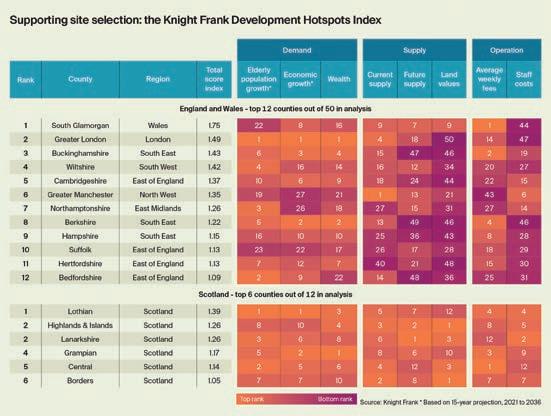
East of England as the best prospects for development with seven of its 12 hotspots in these regions.
The report notes the availability of high fees in the Southeast but adds capacity ramp up is being delayed by existing provision.
Greater London had the second highest index score.
Knight Frank said these counties tended to score well due to expected demand for care beds, indicated by high elderly population growth, economic growth and wealth – all of which were drivers of bed demand for self-funded residents.
Knight Frank transacted almost £1 billion of assets in the last six months with investors, including REITS, private equity, infrastructure, and APAC funds.
18 | JUNE 2023 CARING-TIMES.CO.UK business | surveys & data


















CARING-TIMES.CO.UK JUNE 2023 | 19 provider focus | business Smarter equipment for your care home Reduce utility bills with e cient equipment
washing machines can help you save up to 32% on utility costs Infection control meets energy savings
technology that provides powerful disinfection at lower temperatures and peace of mind from on hand care specialists Save time with MyJLA See essential documents, pay bills and book engineers online Energy use reporting with JLA Connect Get energy bill cost estimates plus remote engineer monitoring for laundry machines Visit: jla.com/care-homes We’ll take care of it Laundry Catering Infection Control Fire Safety & Security Heating & AC
Smart
Wash
The new Presslait MATRIX height and sideways adjustable washbasin
In any accessible bathroom, space is key, and with Pressalit’s new height and sideways adjustable MATRIX washbasin, creating space quickly and hygienically has just got easier
The world leading manufacturer and designer Pressalit has introduced the MATRIX washbasin bracket with a choice of integrated basin styles, the MATRIX MEDIUM, or MATRIX ANGLE DEEP, featuring a new, simple to use, discreet adjustment for both height and sideways movement.
The ultimate in functionality and hygiene, the MATRIX washbasin makes the best use of space in the bathroom whilst accommodating the changing needs of both users and caregivers. Supporting self-reliance, space optimisation and a sense of security in the bathroom, the new adjustable washbasin has been designed for use in a wide variety of installations, from a private home, care setting, institution or a hospital.
Whether for a seated or standing user, or when a carer is assisting, the new MATRIX washbasin offers a flexible solution and safe working environment, offering the commitment to quality, practicality and design that Pressalit makes its priority.
Adjustment can be carried out safely with one hand, and requires very little hand strength to operate.
The vertical rise and fall allows for a variation of 300mm, with options available for either a manual handle or intuitive electric power button. The latter is recommended for a care or hospital setting where frequent adjustment is required, offering huge time saving benefits and improved working conditions for staff, whilst the manual solution is suitable for a bathroom where there’s only one user, or multiple users with the same needs.
The MATRIX MEDIUM AND MATRIX DEEP ANGLE washbasins both feature integrated handles for additional user support.
Andrew Lowndes, sales director for Pressalit in the UK, says: “Some people need a lot of help in the bathroom, others little or none. The new MATRIX basin bracket is a flexible solution, taking into account the specific needs of the user at any given time. By simple adjustment for height, or to create space sideways for greater access to the shower or toilet for wheelchairs, this helps create situations that boost self-reliance and help provide a greater degree of freedom.”
The easy-to-move washbasin can be adjusted smoothly sideways to a range of 500mm, to create greater access when using the shower or toilet for a wheelchair user and carer, by means of a discreet handle located underneath the basin.
With both hygiene and aesthetics in mind, the discreet MATRIX bracket’s operating panel fits tightly against the wall and snugly against the washbasin, preventing dust and dirt from settling in hard-to-reach places. All surfaces are large, smooth and easy to wipe.
Pressalit has many years of experience and expertise in the field of designing accessible bathrooms. The company will provide advice on everything from space optimisation to rules and guidelines for design and the choice of solution and installation, creating the best conditions for the user, and where needed a carer or health professional.
https://pressalit.com/en-uk/products/

20 | JUNE 2023 CARING-TIMES.CO.UK business | advertorial
matrix-adjustable-washbasin-solution/
"Whether for a seated or standing user, or when a carer is assisting, the new MATRIX washbasin offers a flexible solution and safe working environment"


30 June – 01 July 2023 NEC Birmingham Calling all care managers! We’ve partnered with Sonia Rai, founder and director of Nectar HR, to answer all your HR questions. Send us your dilemmas and we’ll share the answers anonymously on our Care Managers Show website. Free tickets Entertainment Free CPD Operational excellence Technology Wellbeing caremanagersshow.co.uk Hostedby Davina Mc C lla #CareManagersShow
24 November 2023
Platinum Suite, London
Supplier of the Year Award
• New for 2023
• Free to apply
• Recognising the best suppliers who support the industry
• The winners will be announced at the National Care Awards in front of 1,000 industry guests




• The event will also be covered in Caring Times and mailed to 10,000
• Option to attend with your team, key clients or care providers.
nationalcareawards.com/enter
#CareAwards23
|
Kingsley Healthcare partnered with Midlands-based Deeley Construction on a 66-bed care home in Olney, Buckinghamshire. Scheduled to open in spring 2024, Olney Meadows has been designed by award winning architects Condy Lofthouse.


buildings that have been refurbished in recent years. The home has been owned by Tony McLean and Conor Gallagher of Excellence in Care Group since May 2021.

Kingsley Healthcare began construction work on a new luxury replacement for its Eversley Nursing Home in Great Yarmouth, Norfolk. The last residents of the home moved into accommodation in May ahead of demolition of the existing nursing service as part of Kingsley's Vision 2025 strategy to invest in boutique, luxury homes for today's discerning care seekers. The home is set to open in autumn 2024.
Exemplar Health Care opened a £3.7 million care home in Greater Manchester and a £6.2 million, 30bed specialist care home in the West Midlands. Adswood Lodge in Stockport specialises in supporting adults living with dementia, acquired brain injuries, complex mental health conditions and physical disabilities. Shire Oaks Court in Walsall will provide specialist nursing care for adults living with complex care needs, including: mental health needs, dementia, neuro-disabilities and physical disabilities.

bedrooms have also been created and fully refurbished, including new en-suite bathrooms.
Emilda Healthcare purchased Braintree Nursing Home in Essex, a Good-rated home registered to care for adults living with dementia, mental health conditions, physical disabilities, sensory impairments, and substance misuse problems. The home is registered for 51 residents and comprises 41 bedrooms spread across two separate two-storey
Not-for-profit care provider Anchor began construction of a supported housing development in Woodford, East London. The site, comprising 87 one- and two-bedroom, high quality apartments and 17 two-bedroom bungalows, includes access to Anchor’s Be Well 360 healthy lifestyle programme and a 24-hour response call system with a local manager who will be on hand to provide help and support.
Maple Leaf care home in Grantham, Lincolnshire was given a new look following a £500,000 investment by Barchester Healthcare . The investment included a new café, spa bathrooms and the complete refurbishment of communal areas with new flooring, furniture and décor. New

Hartford Care opened a new stateof-the-art care home in Aldershot, Hampshire on 22 May. Harlow Hall, which was built by LNT Care Developments , offers dementia care, residential care, day care, respite breaks and end-of-life care across 66 en-suite bedrooms.


Sid Bailey luxury care home had its grand opening in Brampton, Rotherham with an official ribbon cutting ceremony led by MP John Healey. The 5-star luxury care facility has been designed and purpose-built by LNT, and is at the forefront of energy saving technology. The home has an outstanding EPC ‘A’ rating, and will operate without gas as 80% of the roof is covered in solar panels for electricity generation, and extensive ground source heat technology will be used for water heating, underfloor heating and air cooling.

CARING-TIMES.CO.UK JUNE 2023 | 23 property & development | business
Olney Meadows
Eversley Nursing Home
Braintree Nursing Home
Adswood Lodge
Anchor's Woodford site
Maple Leaf
Harlow Hall
Sid Bailey
International law firm DAC Beachcroft has appointed partner Hamza Drabu as head of its health and social care team, replacing Nigel Montgomery, who has held the position since 2003. Montgomery will remain as a partner in DACB’s clinical risk team. Drabu, who joined DACB in 2012, acts for a wide range of UK and international clients in the health and social care sector, including NHS commissioners and providers, medtech and digital health companies, independent health and social care operators, and voluntary sector organisations.



came after Kate Terroni moved to the interim role of deputy chief executive. Bullion is currently executive director of adult social services (DASS) at Norfolk County Council, and a member of the Norfolk and Waveney Integrated Care Board.
Real estate advisor Savills has appointed Nicholas Hare as an associate in its healthcare and senior living team, which sits within the firm’s operational capital markets (OCM) division, based at Savills London head office. Hare most recently worked at SportsFi, a corporate finance advisory boutique where he was a director in the capital markets team and responsible for the global capital markets function, developing relationships across the US and Europe. Before this, he was head of capital markets at Glenhawk, a short-term real estate lender.


East Anglia-based care home operator Black Swan has appointed Chloe Boon as care home manager at The Beeches Care Home in East Harling, Norfolk at the age of just 24. The Beeches provides care and support to up to 46 people and was rated Outstanding in its last inspection by the Care Quality Commission in April 2020.

Scottish care home operator Meallmore Group appointed Anne Gardner as the new manager at Kincaid House in Greenock, Inverclyde. Gardner, who previously held the position of deputy manager at Kincaid and has almost 15 years of experience in the care sector, joined Meallmore in 2020 as deputy manager of Belleaire Care Home in Greenock, before moving to Kincaid later that year. A trained nurse, she has a strong background in private sector care, and developed her career from a nurse into a management position in a care home in Paisley.
 The CQC appointed James Bullion as interim chief inspector of adult social care and integrated care. Bullion’s appointment
Boon started working at Black Swan in 2016 as an apprentice care assistant aged 17.
The CQC appointed James Bullion as interim chief inspector of adult social care and integrated care. Bullion’s appointment
Boon started working at Black Swan in 2016 as an apprentice care assistant aged 17.
24 | JUNE 2023 CARING-TIMES.CO.UK business | people moves in association with
Hanza Drabu
James Bullion
Nicolas Hare
Chloe Boon
Anne Gardner
Top 10 Laundry Myths Busted
Not everything you hear about laundry is true! Laundry experts, WASHCO, bust some common myths to keep your laundry clean and infection free.
1) Clean and disinfected are the same thing
Contrary to popular belief, clean and disinfected aren’t the same! It’s still possible for washed, germ-free linens to have stains or discolouration, making it essential to choose the right cleaning method for each wash to keep linens clean, infection free and presentable for residents.

2) One solution fits all
Not quite…Ozone may be the perfect solution to avoid damaging woollens at high temperatures, but thermal disinfection is better for sheets, effectively removing germs, stains and discolouration. WASHCO will listen to your laundry needs and find a solution that works for your care home.
3) There’s no difference between domestic and commercial machines
With greater functionality, capacity and durability, commercial machines are engineered to minimise downtime and streamline processes, which can be a game changer for care homes. Not to mention they are WRAS approved and can be programmed for thermal disinfection with improved temperature controls.
4) Servicing of equipment isn’t that important as long as you clean the machine
For optimum performance, regular maintenance of your laundry equipment is key. This ensures everything is working correctly and cleaned effectively. It also means fewer breakdowns and less disruption for your care home.
5) The washing cycle is the most important element in infection control
Maintaining high hygiene standards in your care home goes beyond selecting the right washing cycle. Properly separating dirty and clean laundry is essential for thoroughly clean laundry and ensuring a safe environment for your residents.
6) Barrier laundries stop infection
Barrier laundries are effective at stopping infection in care homes, but only if the right processes and procedures are followed.
7) It doesn’t matter if you overfill your machine
If you want to make sure your laundry is clean and infection-free, it’s important not to overfill your machine. For optimal cleaning results, it’s important to consider the amount of laundry your care home produces and use machines with the appropriate capacity, we advise allowing 0.5 kilos per resident.
8) Thermal disinfection kills all germs
Although thermal disinfection, such as hot temperatures, can kill germs, it’s essential for care homes to follow best practices. Health Technical Memorandum recommends hot wash cycles of 71°C for no less than 3 minutes, to ensure clean infection free laundry.
9) Drying on high heat settings kills bacteria
Despite drying on high heat settings being able to effectively kill bacteria, we don’t recommend it, as it can damage or destroy most fabrics and linens, which can be costly for care homes to replace.
10) All laundry detergents are the same
Laundry detergents have different formulations, making some more effective, on certain types of laundry than others. It’s essential to choose the right detergent for your care home’s laundry to ensure it’s clean and germ-free.
Who are WASHCO?
WASHCO are specialists in commercial laundry equipment, installing, advising and repairing across the UK. Working with industry-leading brands such as Miele, Speed Queen and Primus (Alliance), we deliver a complete solution to care homes via our highly trained technical team and network of field engineers. Our line-up of innovative solutions includes a wide range of equipment, such as washing machines and dryers, plus commercial detergents and chemicals.
With WASHCO, your laundry is in safe hands.
Care homes across the UK are choosing WASHCO to transform their laundry. For more information, call us on 08000 546 546 or email hello@washco.co.uk
CARING-TIMES.CO.UK JUNE 2023 | 25 advertorial | business
Sustainability volunteering
In our ongoing series, Aaron White, Head of Business Services & Sustainability at Oakland Care, shares small but effective changes care homes can implement on their sustainability journey. This month he focuses on encouraging local volunteering

Volunteering in the local community is a simple, responsible thing for any business to do if they are looking to develop their ESG program. Doing so not only gives back to the local environment, but drives positive benefits for the business as a whole. Volunteering locally can help develop strong links throughout the community, raising your profile, showing that you are an organisation that is trying to work more sustainably.
There are two approaches to developing your Green volunteering as a company: a central corporate approach, or by building local relationships. At Oakland Care we have found encouraging individual care homes to make links with local organisations to be the most effective so far.
Each of our homes has a Customer Relationship Manager, and these managers will naturally develop very strong links with the local community as part of their daily role. They can use their contacts to find a local organisation that is looking for help with a Green project, or a local council that has volunteering events planned - anything that our team can get involved with. If you have Green Champions or other environmental advocates in the home, they can also research to see what is coming up in the local area.
Alternatively, homes can create their own event. It’s amazing how much you can achieve when ten members of staff spend two hours litter picking at the local
park. Residents can also get involved: some of our homes which are located by the coast run their own beach cleans, and there are always some residents who thoroughly enjoy go to the beach in the car, cleaning and litter picking in the fresh air, and of course having some fish and chips afterwards!
At Oakland Care have also seen some success with the corporate approach, where we build business-wide links with a particular charity or organisation. We recently linked with the Essex Forestry Initiative and were able to book volunteers from each of the homes onto a tree planting schedule in January. We planted more than 1,000 trees in three days, and this is a relationship that will be ongoing year on year.
Businesses could of course make a donation to a good cause instead, but then you have none of the benefits of physical volunteering – the boost to staff wellbeing, a change from normal routine and getting out into the fresh air, and the pride in what we have achieved. That is infinitely more
valuable from an ESG perspective than making a donation for an organisation to ‘plant a tree’ on their behalf.
Although volunteering for green initiatives should be strongly encouraged, it shouldn’t be forced on the team, otherwise it isn’t ‘volunteering’. We choose to pay our team to take part as if it were a worked shift, so there is a cost implication to this of course.
However if you can’t commit those funds yet, there is nothing to stop you arranging something and calling for volunteers to join on their own time. You may have fewer people involved, but as long as a few people from the senior team are leading the way you are still going to have a successful event, providing a huge boost to wellbeing - and most importantly you will be making a positive impact.
Whichever approach you choose to take, the important thing is to take those first steps – find an organisation or event you can support, or create your own. And have fun!
26 | JUNE 2023 CARING-TIMES.CO.UK business | sustainability matters
Aaron White
"Volunteering locally can help develop strong links throughout the community, raising your profile, showing that you are an organisation that is trying to work more sustainably."
Sustainability – a question of perspective…
Sustainability is about taking action today to protect the long-term future of our planet, our communities and our people. With the economy at rock bottom, massive social pressures and a distinct lack of political appetite to bite the bullet on social care investment and reform, surely that means that wellmeaning sustainability changes will get shuffled to the bottom of the deck by executive teams focussed on the here-andnow?
In my role as group sustainability director at CareTech, I am very well aware that first and foremost we have to deliver a high-quality and economicallyviable business. Noble ambitions for sustainability mean nothing if the business doesn’t deliver on its bottom line financial viability.

The good news, however, is that delivering on key sustainability issues can address short-term pressures as much as long-term challenges. But it does require a shift in perspective. Let me use just three examples of what I mean.
Energy costs
Almost two-thirds (60%) of social care providers cite utility bills as a key cost pressure, with some providers reporting 500% increases in energy costs over the last 12 months. Increased energy and fuel costs aren’t going away. The costbenefit analysis of reducing our energy usage is clear, with the recouping of the initial investment for improved energy efficiency and more renewable energy sources such as solar PV panels becoming ever-shorter. Considering a longer-term investment scenario, therefore, provides the opportunity for both costs and carbon savings.
Switching to low-carbon vehicles
As I’ve written about previously, while the up-front costs of EVs are still significantly higher than combustion engine equivalents, when you look at the whole-life costs, the latest research shows
that EVs are now slightly cheaper to run than their petrol equivalents. With new salary sacrifice lease schemes, companies have a great opportunity to lower their (and their employees’) carbon emissions and save money at the same time.
Pay rates
Now this is the big one! Hft's Sector Pulse Check report highlighted that 92% of respondents consider workforce pay as the most significant cost pressure. The King’s Fund has reported that an estimated 30% of care workers are paid at or within nine pence of the minimum salary level. Isn’t that the obvious thing to do? Well, yes, if you are only looking at the immediate direct costs of paying salaries. But, just shift your perspective a little and it rapidly becomes clear that this short-term approach doesn’t stack up commercially in the longer-run.
Skills for Care reports an average 29% employee turnover rate in the sector (more than double that of the NHS), with 75% attributing this to low pay rates in the sector. But, to replace a salaried employee can cost, on average, between six to nine months’ salary when you factor in recruitment costs and training expenses. To cover staff gaps, the sector engages a growing army of agency staff – but agency staff cost 80% more than permanent employees. And research is also clear that longer-serving staff are more skilled, deliver greater productivity and higher quality. When you look at all of the costs, the commercial case for bearing down on salary costs looks increasingly short-sighted.
Increasingly, the case for switching to the Real Living Wage is being recognised as being the right thing to do for employees and for employers. Independent research shows that 86% of employers report that Living Wage accreditation had enhanced their reputation as an employer and 64% said that it had differentiated them
from others in the same industry or activity. Crucially, over half of employers report the Living Wage has improved both recruitment and retention, with 45% saying that accreditation had also improved the quality of applicants and 29% that it had raised skills amongst Living Wage employees. One social care provider chief executive recently spoke passionately about how switching to the Real Living Wage had reduced staff turnover from over 50% to below 40% in less than a year.
Truly effective leaders understand their role is about striking a balance between short-term needs and longterm vision, ensuring their decisions contribute to the long-term sustainable success and growth of their organisations and recognising that all of us have a wider set of responsibilities for which we are accountable beyond our own organisations.
This isn’t just a moral plea, however, for altruistic values-led leadership. Treehugging won’t get sustainability leaders very far! We have to be as commercially astute, perhaps more so, than our colleagues if we are to bring our executive teams with us. And we have to show how a long-term perspective offers solutions for short-term challenges.
CARING-TIMES.CO.UK JUNE 2023 | 27
Jonathan Freeman, group sustainability director at CareTech, says sustainability requires a fundamental shift in perspective
matters | business
sustainability
Jonathan Freeman
Be Warned! Warning notices are on the rise
Samantha Guest, Ridouts registered foreign lawyer – New Zealand, offers advice on how to address a Warning Notice

While the increased CQC scrutiny during a period of inspection can be stressful for a provider, the receipt of the draft inspection report is often equally challenging. This challenge is twofold when receipt of the draft inspection report is accompanied, or closely followed, by a Warning Notice. At Ridouts, we have seen an increase in the issuing of Warning Notices and seek to urge providers to not become overwhelmed with this additional measure of CQC scrutiny.
What is a Warning Notice?
Warning Notices are issued by the CQC where a service is deemed to have failed, or is continuing to fail, to comply with a legal requirement. The CQC can issue a Warning Notice for an alleged current breach of regulation or for a past breach, which may have been rectified, if it considers that the past breach is serious enough. The CQC’s decision to issue a Warning Notice can be classed as ‘low level enforcement’ action and, if overlooked by a provider, may escalate to a form of enforcement action with wide reaching commercial consequences – for example, a Notice of Proposal seeking cancellation of a provider’s registration. A Warning Notice must be issued in writing and must state:
- The relevant legal requirements that the registered provider is not complying with
- How the registered provider did not comply
- The timescale within which the CQC expects the registered person to become compliant.
There is no legally-set timeframe for complying with a Warning Notice and the CQC can set any compliance period which it considers reasonable. Be wary that the timeframe for complying with the Warning Notice (demonstrating compliance with the alleged regulatory
breach) and the deadline to submit representations to the Warning Notice (your arguments for why the Warning Notice should not have been issued and/ or published) are two separate things and often fall on different dates.
What is the effect of a Warning Notice?
The content of a Warning Notice is often published, and widely distributed amongst stakeholders, by the CQC. The publication, or sharing of information, can lead to unwanted attention from relevant stakeholders, such as the local authority, other regulatory bodies, service users and relatives. While providers are often aware of the damage that an inaccurate inspection report can have on its service, there is a lack of understanding that the same impact may also be obtained through the publishing of a Warning Notice.
Warning Notices do not undertake a ‘rating’ exercise and therefore may be considered as less outwardly harmful. Despite this, a provider should not forget that a Warning Notice is a form of enforcement action which tells the reader that a service is failing to comply with its legal obligations and, as a result, is putting its service users at increased risk.
How do you respond to a Warning Notice?
The unfortunate side effect of the CQC issuing Warning Notices alongside a draft inspection report is that the timeframe to respond to both documents is the same, namely ten working days. This is despite the nature of the responses to a draft inspection report and Warning Notices being distinctly different.
Warning Notice representations are not as restrictive as factual accuracy comments and may cover: serious errors, factual inaccuracy, failure to meet the legal test, proportionately and whether there is sufficient public interest in
publication. This allows the provider to comment on the most ‘up to date’ position of the service with emphasis on the steps that have been taken and/ or are being taken to address the CQC’s perceived errors.
At Ridouts, we are well-versed at preparing representations which robustly address all arguments available to the provider. The desired outcome to these representations is that the CQC conclude that its issuing of the Warning Notice was erroneous and should be withdrawn or, at the very least, that it should not be published. If this is not achieved, the representations present the provider with a valuable opportunity to ensure its voice is on record. This is not an opportunity which should be dismissed.
Further, the increase in issuing a Warning Notice alongside the draft inspection report is fundamentally flawed as the CQC solely rely on the documents reviewed, processes witnessed and information received over its period of inspection. This information is normally being contested by way of factual accuracy comments meaning the CQC may have relied on potentially inaccurate, misconstrued or untested information to support its issuing of the Warning Notice.
The tight timeframes and the nature of the response can be overwhelming but we seek to empower a provider to utilise its right of response to challenge the CQC and put its position on record. If you are a provider who is currently facing these concerns and is seeking advice or assistance in preparing a response, please contact Ridouts Professional Services.
business | legal & regulatory 28 | JUNE 2023 CARING-TIMES.CO.UK
Samantha Guest
CHEF



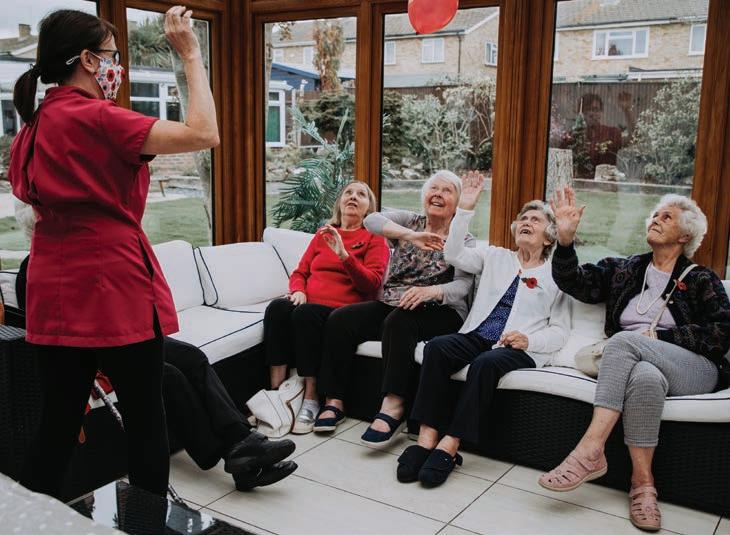
care
Nightingale Hammerson chief executive Jenny Pattinson on integrated care systems
OF THE MONTH
Kim Pegasiou, head chef at Signature at Hendon Hall
41 10 QUESTIONS WITH Natalie Marshall, director/manager of Deeside Home Care
32 CT ON THE ROAD
Kevin Hewlett tells us what makes Outstanding rated Hall Place so special








care | welcome 31 CPD IN FOCUS Orchard Care Home's dementia support worker training programme 32 C T ON THE ROAD We visit Outstanding rated Hale Place care home 34 INTEGRATED CARE Nightingale Hammerson chief executive Jenny Pattinson on the benefits of integrated care 36 INTERGENERATIONAL CARE Wellbeing Care discusses the benefits intergenerational care 37 NORRMS’ BLOG Columnist Norrms' McNamara on the daily challenges of living with dementia 38 CHEF OF THE MONTH Kiri Pegasiou, head chef at Signature at Hendon Hall 39 10 QUESTIONS WITH Natalie Marshall, director/manager of Deeside Home Care 40 CARE SECTOR'S GOT TALENT Show stopping highlights from this year's event 42 CREATIVE CARING Carers demonstrate creativity through fun and innovative activities 43 CARE FOR TOMORROW Anita Astle on how tech can help meet residents' needs and Jane Brightman on driving digital adoption
30 | JUNE 2023 CARING-TIMES.CO.UK 31 32 34 36 37 39 40 43
care contents
Step up your career!
Orchard Care Homes is introducing a new programme to allow existing staff and new recruits to progress into a dementia support worker role

The bespoke, seven-week, ‘StepUp to Dementia Support Worker Programme’ follows the success of its intensive ‘Step-Up’ training programmes for carers wishing to advance their careers.
Hannah Miller, head of dementia at Orchard Care Homes, said: “There is a need for more dementia specialists across the sector with the required skills to support people with various levels of dementia. Orchard’s ‘Step-Up’ programmes effectively fast-track carers – both experienced and new to the sector – on their chosen career path.

“We have seen success with our ‘StepUp to Senior’ programme, which follows the same focused training model. Here we were able to help ambitious carers to work towards more senior roles by arming them with the skills needed to support people in our homes to a higher level and be involved in leading more junior staff.
“Our ‘Step-Up to Dementia Support Worker’ programme aims to fill the big gap in recruiting skilled workers into the sector. By investing in our people, we truly believe that we are helping carers to fulfil rewarding roles at Orchard and provide them with the opportunities and qualifications they need to step-up the career ladder.”
The initiative comes as the group has seen an increased need for specialist dementia support skills across its 23 care homes, and five dementia specific Reconnect Communities, within the North of England and Midlands. With a rising 55% of people supported across the group now living with some degree of dementia, the training launch has come at a vital time.
The training comprises the seven modules of: person centred care; dementia awareness; communication; meaningful engagement; distress response and de-escalation; Mental Capacity Act 2005 introduction; and reflective practice – what is expected of staff at Orchard Care Homes.
Each candidate will be mentored by an experienced member of Orchard’s dementia support team at their place of work who will help them to develop skills and observe practices needed to become a passionate and dedicated dementia support worker. The training programme will prepare those completing the Step-Up training for Orchard’s Level 3 Dementia Promise training course.
To qualify for the course, candidates will need to have completed a threemonth induction with the company and ensure all Mandatory and Statutory training is up to date.
Currently, 96% of Orchard’s care homes
rated Good. In addition, the group has recently launched its Dementia Promise initiative, and is committed to providing every colleague with bespoke, evidencebased dementia training relevant to their role, plus further investment in technology, recruitment, and its care home environments.
cpd in focus | care CARING-TIMES.CO.UK JUNE 2023 | 31
“With a rising 55% of people supported across the group now living with some degree of dementia, the training launch has come at a vital time"
Hannah Miller
On the road: Keeping it in the family
Outstanding rated Hale Place, in Tonbridge, is one of England’s most decorated care homes, having racked up 21 awards and 36 finalist nominations. Owner, Kevin Hewlett, reveals what makes Hale Place so special
Led by Kevin Hewlett and his family, Hale Place has built a reputation as one of the country’s leading dementia care homes. The home has amassed 21 awards, including Care Home of the Year, at the National Care Awards in 2022, and has been visited by the BBC, ITV, Department of Health and Social Care and the NHS as a centre of excellence.
Hewlett, a National Care Awards Lifetime Achievement Awards winner, registered his first bed 35 years ago, after having previously worked in finance.
“I knew I needed to do something meaningful with my life,” he told us.
“My mother-in-law had a care home, where I worked nights to get a feel for whether I wanted to go into this or not. I did that for six months and when this building came up for sale, I thought, let’s try it.”
Starting off as a small family home, with just three residents on local authority contracts, was tough, with Hewlett having to take on other jobs to stay above water, including running his own care home cleaning business, working for a national care association as a director of a charitable training centre and finally running his own social care training centre for 12 years, with his wife, Mandy.
“Mum adores it. She has been here three years. I wouldn’t move her. They are always doing something. Taking them out. They have singers come in the garden. It’s lovely. They keep us well informed. They are constantly innovating and changing things which is great.”
“That was a good grounding and gave me money to survive and insight into other care homes so I could observe and see what was good about them,” Hewlett said.
The care home business became a labour of love for Hewlett as he struggled to make a profit for more than a decade.
“Local authority fee levels could not support a quality service where peoples’ lives could be enhanced, we strived to be the best we could be and having operated with council contracts for 12 years, we decided to go fully private in 2000 so we could achieve our primary objectives; happy lives for everyone,” Hewlett said.
The effect on his business was immediately transformative.
“The fees doubled overnight and I had no problem filling the home,” Hewlett said. “I had wonderful staff and we were able to improve their working conditions and provide a quality of life for residents that exceeded peoples’ expectations.”
The home has never looked back and it soon began to garner awards and build a local and national reputation for excellence.
“The reputation of Hale Place has been flourishing within the local
community and in the wider business world for many years, but renewed attention and recognition helps to embed trust and credibility among our customers, potential residents and suppliers,” Hewlett told us.
So, what makes Hale Place so special?
“What sets us apart, is keeping people active,” Hewlett explained.
“Activity is one of the most important things with dementia. Providing stimulation and keeping people engaged in activities that make them laugh and smile is key to a happy life. We have had people come here and burst into tears and say ‘I didn’t know a care home like yours existed’.”

The home shares a jam-packed monthly activities schedule on its website so that family members can see what their loved ones are getting up to.
“We use a wide range of diversionary activities when responding to the individual needs of a person,” Hewlett continued. “Activities may include walking the dog, petting our animals, music, dance, café and pub visits, boat trips or just shopping in the village.
“We’re all about what we can do to keep people active and engaged with the local community, encouraging people to enjoy life outside the home.”
Hale Place hosts weekly barbecues for
32 | JUNE 2023 CARING-TIMES.CO.UK
care | ct on the road
Please to meet you: a resident enjoys a Hale Place petting session
residents and their family members and residents enjoy Kingfisher Trust boat trips on the River Medway throughout the summer where, again, family members can join their loved one.
“We had a resident who had been reclusive for five years, whose brother was very worried about them when they moved in and stated that she wouldn’t participate in anything,” Hewlett told us.
“On day four, I sent them a picture of her on the River Medway steering a boat!”
It’s not just residents who are well looked after with trips out and about, however, as staff members are also shown appreciation with expenses paid trips to awards events, Royal Ascot and nights out in London.
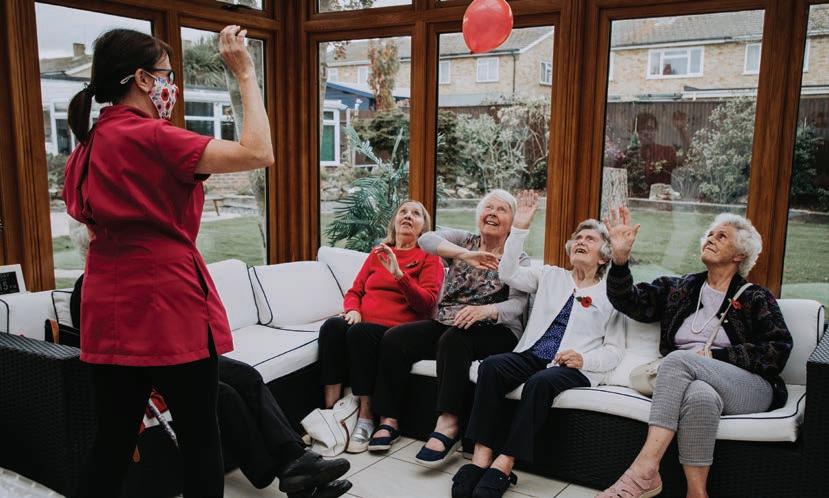
“We do our best to give back to them a
little bit of what they deserve, including an annual loyalty bonus of up to £1,000,” Hewlett said.
Keeping residents safe while living fulfilled lives is another key priority of the home.
“My son Dudley (operations manager) has introduced technology, throughout our operation, over the past three years, mainly concentrating on the safety and supportive technology,” Hewlett said. “Upgrades and developments have included bed leaving alarms on the mattresses, motion sensor alarms near stairs, alarmed cameras covering driveways, emar, digital care planning and HR, making Hale Place one of the most tech savy providers around.” Hewlett noted.
During Covid, Hewlett’s other son,
Barney (properties manager), landscaped the gardens to further reduce the risk of falls, widened paths, built lodges and replaced fences to improve safety.
“There are risks in everything, which is why we consult the resident’s families about acceptable risk and how we can make them as safe as we possibly can, while they enjoy a fulfilled life with our ongoing support,” Hewlett shared.
“You can’t prevent all falls, but, even after 35 years, we continuously update and upgrade the whole environment. If we see someone new, who has particular issues that concern us, we seek to minimise risks for that person.”
It’s this ethos of continuously innovating, adapting and improving that has made Hale Place one of England’s most decorated and lauded care homes.
“Winning these awards has provided a morale boost to the family members and all employees, both past and present, who have contributed to the success of the business,” Kevin concluded. “It serves as a source of inspiration and motivation to continue working hard and striving for excellence for all the people we support. Together, we will continue to strive to exceed the expectations of all our service users, we will focus on keeping people safe and ensuring a happy life for all who work in our service and all that have been entrusted into our care.”

CARING-TIMES.CO.UK JUNE 2023 | 33 ct on the road | care
Residents enjoy a packed activities programme to boost mental and physical wellbeing
Integrated care: better for residents but can it work in practice?
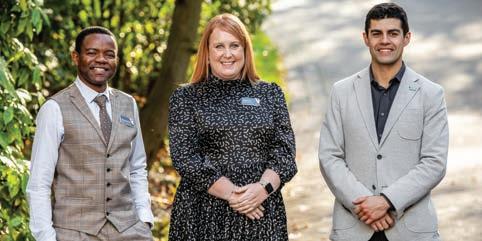
Introduced in 2016, ICSs have been lauded as the solution to social care’s move towards closer parity with the NHS. Bringing together all the elements of health and social care locally, improves outcomes for the whole population, while enhancing productivity and value for money. There’s no doubt that various partners within the health and social care systems work hard at planning for integrated systems but as yet they have not been wholly successful in implementing them.
There have been vanguard projects and pilots, with success in small areas of the health and social care system, the Red Bag for hospital admission is the perfect example. However, post pandemic and following years of underfunding and lack of investment, both the NHS and social care systems are in crisis and there’s a more urgent need to make this work to deliver better outcomes for people.
I believe that delivering true integrated care at point of care delivery is the solution and we have found a way to do this at Nightingale Hammerson. However, it is under threat. We have just recently had our funding removed from the NHS for our in-house pharmacy technician who was delivering incredible outcomes for our residents. This was, I feel, a short-sighted decision taken by the NHS who in this case put budget before the outcomes for people. There was no assessment of what this service was delivering or could deliver to the community before the funding was removed. I feel passionately that our local Integrated Care Board (ICB) should be looking at what Nightingale Hammerson’s care model is delivering and use it as the example of how ICS can be implemented locally for the population in and around local care homes, learning from what we are already delivering, supporting what we are striving to achieve and modelling future care pathways on their findings.
At Nightingale Hammerson we believe we are delivering integrated care in partnership with the NHS and other health and care specialists to our wonderful residents and the outcomes speak for themselves. For example, we have just recently been applauded by the London Ambulance Service for delivering the lowest non conveyancy rate by at least 50% across local care homes, meaning we only need the support of acute care when it is really needed, saving significant sums to the NHS.
Our ICS has been delivered because we are led by responding to the needs of our residents. We have not gone out intentionally to deliver integrated care. We listen to our residents and we deliver what they need to ensure a high quality of care and an amazing quality of life. This just happened to grow organically and as we have reflected on what we have achieved and mapped to the expected outcomes of the ICS we believe we are delivering this for our residents now.
So, what does our ICS deliver? No avoidable hospital admissions, our inhouse GP service delivers medical care at time of need in the comfort of the home. Medications are delivered and monitored as required by our in-house pharmacy technician. Mental health and well-being is supported by our in-house psychologist, physio and occupational
therapists, where exercise and treatments are delivered as required in the in-house gym or in rooms. Appointments are as required, with no wait. Entertainment from the in-house engagement team and special relationships built with the 40 babies and young children from our inhouse nursery provides exceptional social interaction and joyful activity every day. All of this has delivered a quality of life and care for our residents that has been recognised externally; we have recently been rated Outstanding for the second time by CQC.
We believe our model is an exemplar of local resident led care that if expanded could improve the quality of life for the thousands of older people living in care homes, minimise avoidable hospital admissions and support the acute health care sector to deliver. We just need a seat at the table of the ICBs as social care providers to explain to the ‘experts’ how this model of exceptional care can be delivered with a little additional effort, thought and a ‘resident first’ focus. They might even be surprised to learn how exceptional care can and will save the NHS significant resource. We would welcome a visit from our local ICBs to demonstrate what we do and how we do it. To date, as always social care improvement appears to be low on the list of priorities.
34 | JUNE 2023 CARING-TIMES.CO.UK care | integrated care
In a Caring Times exclusive, Jenny Pattinson, chief executive of Nightingale Hammerson, looks at the potential for Integrated Care Systems (ICS) for moving social care to closer parity with the NHS
(Left to right) Clemence Muchingaguyo, registered manager of Nightingale House and head of nursing, Jenny Pattinson, chief executive, and Nuno Lopes, director of care
CARING-TIMES.CO.UK JUNE 2023 | 35 promotion | care If things couldn’t get any better, talk to us today about how you can reinvest your savings into competitive mandatory training and CPD short courses for your staff! SAVE BIG THROUGH THE USE OF APPRENTICESHIPS
you know that through utilising apprenticeships for your existing and future employees, that you could save and claim £1000’s of pounds?
Exemption from paying class 1 National Insurance for apprentices under the age of 25
Claiming money back through the Workforce Development Fund
Monetary incentives for
apprentices and/or
an EHC plan
Reduced
through improved staff retention What does it look like for you? Scan here: for more information 01753 596 004 info@impactfutures.co.uk
Did
9
9
9
employing young
those with
9
recruitment costs
Generations unite
Joy Henshaw, registered operations manager at Wellbeing Care, discusses the power of intergenerational mixing in care homes for companionship, learning and wellbeing

The concept is simple yet powerful: pairing the youth with elderly residents to encourage companionship, joy and learning. Creating an enriching environment by collaborating with community groups and local schools can offer many benefits for care home residents, some of which I explore below, as well as highlighting some considerations for organising an interactive session.
Potentially, the biggest misconception about intergenerational mixing is that it happens between the elderly population and very young children, but it's important not to neglect every generation between that and understand what they can bring to the table. The laughter of children, the curiosity of teenagers and the energy of young adults are contagious, and residents thrive on this intergenerational interaction.
One of the main benefits of intergenerational mixing is the positive impact it has on the mental and emotional wellbeing of care home residents. Many older adults may feel isolated or lonely and having younger people around brings joy and liveliness into their lives. Residents can form deep bonds with the young visitors and these relationships give them a renewed sense of purpose and connection to the wider community.
Furthermore, it can provide valuable learning opportunities for both the elderly and the young, and when organising this sort of interaction it's important to ensure that it is beneficial
for both parties involved. Elderly residents have a wealth of knowledge and life experience to share, and they take great joy in passing on their wisdom to the younger generation. On the other hand, young people bring fresh perspectives, new ideas and technological expertise that can benefit elderly residents.
When organising opportunities for young and old to come together, it can provide the perfect chance to get residents engaged in more physical activities, without it feeling like a chore for them. Physical activity can help with mental stimulation as residents engage in various initiatives that they might not otherwise partake in. Consider activities such as gardening, arts and crafts, music and games that are not only enjoyable but promote physical movement, cognitive stimulation and social interaction, aiding both a healthy mind and body.
Other activity ideas can be led by the groups residents interact with, as it is likely children will be assigned tasks to complete. For instance, reading, volunteering in the community, or earning the latest badge for their scouts/ brownie group.
Additionally, cross-generation interactions have a positive impact on the culture of a care home. It creates an inclusive and diverse community where people of all ages can come together and learn from each other. It creates a family-like environment and a homely atmosphere, simulating the experience of relatives visiting the homes of their loved ones, which is particularly important for maintaining a sense of normality and independence. It is even more beneficial for those residents who may not have family or whose family visit infrequently.
In short, the benefits of the older generation mixing with younger people in a care home are both immeasurable and invaluable. It brings joy, purpose and meaningful connections to residents, while also providing learning opportunities for the younger
“Additionally, crossgeneration interactions have a positive impact on the culture of a care home. It creates an inclusive and diverse community where people of all ages can come together and learn from each other.”
generation. Implementing this concept is relatively straightforward and costeffective, if not entirely free, and can be an enriching activity to run if not already in practice.
Wellbeing Care is a family-run group of care services that focuses on providing first-rate, person-centred care to older people living in Suffolk and Northamptonshire. One of its homes, The Dell in Lowestoft, has recently opened a Wellbeing Activity Centre in conjunction with Wellbeing Care’s Dell View, which specialises in assisted living services. Both groups have enjoyed a popular breakfast club while cooking and eating together.
36 | JUNE 2023 CARING-TIMES.CO.UK care | wellbeing care
“The laughter of children, the curiosity of teenagers and the energy of young adults are contagious, and residents thrive on this intergenerational interaction.”
Joy Henshaw
30 second ‘away days’
Our columnist Norrms McNamara reflects on what it’s like to live with dementia


One minute my angel Elaine is pointing out a hawk swooping down for its prey in the Devon countryside while we are driving through it, the next ‘WHAM!’ somebody has changed the channel in my mind!! No longer am I sat next to the love of my life while she drives us through God’s garden as we call it, but I am sat all alone, in a bare room with pictures and snapshots of my life surrounding me. They flash before my eyes, some good but mostly bad, tormenting me, teasing me and forcing me to close my eyes shut so tight it hurts, but yet the visions still come. Then suddenly as if from nowhere, the fear sets in, the fear that turns your stomach that makes your hands tremble and begins to make you feel as you are suffering from seasickness!! Oh my God, I’m dying, there is no cure!! I am only 56, I should have at least 25 years in front of me, but I haven’t. A cure is at least 20 years away, I am six years down the line and nothing is on the horizon. My heart sinks, the beads of cold sweat run down the side of my head and I begin to descend into the depths of despair, then, like a FLASH!!
I AM BACK. Back in the passenger seat, Elaine talking to me, asking me if I am ok? Gently rubbing my hand and telling me I was out of it for about 30 seconds, and yet, I feel as if I have just experienced a lifetime of hurt and pain, and yet NO?? Only 30 seconds??
As quick as this happened, I am
now back in the land of the living, I have had my 30 second away day once again, and this came as a little bit of a surprise to me because I didn’t know I had them regularly, but apparently they come and go but with no pattern or time scales whatsoever, now that does sound familiar!! But here I am!! And here I intend to stay for as long as possible, doing what I do. Why am I still here? Because of YOU my wonderful brilliant friends!! Not that long ago,
certainly in my lifetime, I would have been sectioned under the Mental Health Act because of my 30 second away days but not anymore, and that is down to each and every one of you wonderful BRAVE people all over the world who raise awareness about this awful disease dementia and explain to people that it’s not a form of madness but a disease of the brain, because of YOU my friends, I am able to sit in the comfort of my own home and write what I am writing now!! I owe my life to my angel Elaine, that’s for sure!! But I also owe so much gratitude to each and every one of you for all you do, and for that I will be eternally grateful. Hopefully long gone are the nudges, winks and tut tuts, and in their place are TV adverts about dementia, radio adverts about dementia, films, musicals, talks in schools and so very much more. Who knows what will come next? You never know, sometime in the future we might even get people living with their own dementia writing in newspaper’s about it on a regular basis?? HANG ON A MINUTE ????
Till next time…
CARING-TIMES.CO.UK JUNE 2023 | 37 norrms’ blog | care
Norrms McNamara
Chef of the month
Tell us about your background and how you joined Signature at Hendon Hall.
My Mediterranean roots drive my deep love for food and have underpinned my 30-year career as a chef.
I started working in restaurants throughout the 1990s, moving from nouveau cuisine to more freshly sourced and seasonal menus. During my career, I ran a successful restaurant by the Bank of England and worked as an executive chef at a Notting Hill restaurant. Both environments allowed me to fully demonstrate my passion and creativity within my menus.
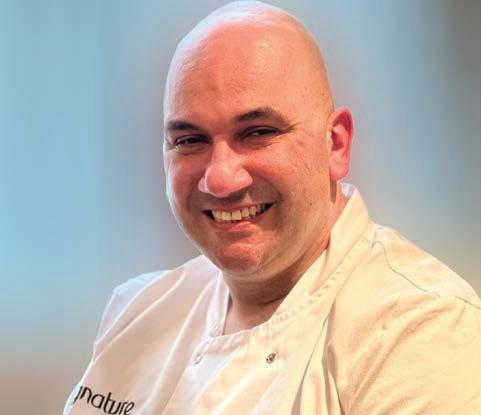
Working at Signature at Hendon Hall allows me to continue in a similar vein. Hendon Hall’s appreciation of quality and customer satisfaction permeates the overall dining experience it provides, and this is what attracted me to progress my career in social care.
What is special about working at Signature at Hendon Hall?
While Hendon Hall is a family, it works tirelessly to meet the individual needs of residents. Seeing the positive impact this makes on their lives is very rewarding. The kitchen and dining teams operate as one hospitality service to meet residents' needs. Doing so requires a true team ethos, and this makes Hendon Hall a special place to work.
How do you vary your menu to provide choice for residents?
As a starting point, we serve a seasonal menu ensuring we fully embrace fresh and local produce. The Hendon Hall team goes further by taking the time to understand what residents specifically need and desire from our menu by holding monthly food forums with residents and their loved ones. We proactively discuss residents’ preferences and how we can best meet them.
What does your typical weekly menu look like?
Our menu includes much-loved staples of our residents’ week, such as Fish and Chips Friday and Sunday Roast Dinners. However, we ensure flexibility
is built into our offering by adapting our menus to world events, special occasions and specific requests from residents.
How do you meet residents’ nutritional and health needs?
Recognising residents proactively observing different diets connected to faith and health, our menu is adapted to support residents. This includes us serving traditional Jewish dishes such as Kafilke fish and Gedempte Chicken.
We partner with Hendon Hall’s care team to support residents’ health needs. For example, we provide residents with a bespoke diet if they need to lose weight and ensure they are not served certain foods that risk impinging their medication.
How do you cater for residents living with dementia?
On a weekly basis, I meet with the dementia team to discuss residents’ nutritional requirements. Reflecting that residents with dementia are typically less likely to engage with food, we
make canapes, small bite desserts and a simplified menu to make it appear less daunting for residents with dementia.
What is your most popular dish?
Grilled salmon. I am pretty sure residents would eat it every day!
What is your own favourite dish?
Grilled diver scallops with chilli dressing. It takes longer to source diver scallops than sea scallops, but the quality is definitely more distinctive.
How do you make the dining experience special for residents and their families?
In line with what marks a successful care home, Hendon Hall’s dining experience is driven by our commitment to caring for our residents, making them feel heard and genuinely special.
Holding oneself to account is important, and we improve standards where we can by listening to both compliments and complaints. All of which allows us to go the extra mile to put and keep a smile on our residents’ faces.
38 | JUNE 2023 CARING-TIMES.CO.UK
care | catering
Kiri Pegasiou, head chef at Signature at Hendon Hall, offers his culinary tips
Kiri Pegasiou
10 questions with…
This month we find out more about Natalie Marshall, director/manager of Deeside Home Care in Flintshire, North Wales

“Every hurdle in business is an important lesson - look for the positives in every situation. ”
What, in your opinion, makes a great care worker?
Absolute integrity, a positive attitude, self-motivation, the ability to make conversation with anyone and more important than anything else - to be naturally caring and have an empathetic nature.
What do you do when life all gets a bit too much?
Book a holiday! As a business owner/ manager I can only really switch off and escape from work completely if I’m abroad. I absolutely love travelling to new places and new countries and planning the itinerary.
Why did you join the social care sector?
Throughout my childhood my grandparents and parents all owned and ran care homes. In my teenage years I helped my mum and dad run theirs. So, after graduating from university, it was inevitable that I’d continue in the family business, and I managed the HR side of operations. I then opened my own domiciliary care agency in 2012 at the age of 26.
What do you enjoy most about your job?
The variety - recruitment, compliance, managing our team, finance, HR, health & safety, marketing, care assessments and reviews - I’m always working on something different to ‘keep all the plates spinning’. As a small independent company, we don’t have different departments or a head office – if it needs doing, I do it.
Who is your social care hero and why?
My mum, Jacqui - she’s run care homes almost her whole nursing career. It’s her footsteps that I’m following in. My mum encouraged me to set up the agency as we could see a gap in the market for high quality domiciliary care. I have learned so much from working beside her. Now semi-retired, mum helps me run the agency one day a week.
What is the one thing you would change about social care?
It’s image - I wish more people recognised it as a rewarding and varied career path. The recruitment challenges we face are often because of a stereotyped image of what people think a carer does day to day. My care team have so many skills and such a wide range of experiences – they are superheroes and deserve more recognition.
What advice would you give your younger self?
Every hurdle in business is an important lesson - look for the positives in every situation.
Which three famous people would you have to dinner and why?
The late Queen, I am a massive royal family fan, and my dream was to meet her. Also, Sir Elton John and Adele to provide some amazing after-dinner entertainment.
What three items would you bring with you on a desert island?
Mascara, bikini and sunscreen.
What is your secret talent?
I am quite artistic and good at crafts – my recent project was a ‘Peter Rabbit Easter Top Hat’ for my son’s nursery competition.
CARING-TIMES.CO.UK JUNE 2023 | 39 registered managers | care
Natalie Marshall
care | care sector
Care Sector's Got Talent

Care Sector’s Got Talent organisers Championing Social Care succeeded in producing an event which was just as entertaining and professional as a televised talent contest. While there could only be one winner, every single performer showed an impressive commitment, not only to their own talent but to the people they support on a daily basis. Derby Arena had never seen anything like it
most important in the sector. “Being a lifestyles co-ordinator is about enriching the lives of residents, finding out what they like and dislike, and doing whatever I can to add to their lives,” she explains.
On the day, Kayleigh was cheered on by her lifestyles team, her general manager and her best friend, while her dad, nan and the rest of her colleagues were watching on the live stream.

WINNER:
Michael & Charlene, Hill View Care Home
Michael Gallagher and Charlene Reeves both work at Hill View Care Home in Glasgow, where Charlene is wellbeing co-ordinator and Michael is a senior care assistant. “I have been doing care now for about ten years and it is a job I absolutely love, it is very challenging but so rewarding,” says Charlene. Michael joined the care sector during the pandemic, and hasn’t looked back.
The colleagues blew the judges away with their rendition of Bradley Cooper and Lady Gaga’s Shallow, but despite appearances Care Sector’s Got Talent was the first time they had sung together. “We’re just winging it!” jokes Michael. “The home manager asked me to find someone to enter, and when I asked Charlene she said she wouldn’t do it unless I was doing it with her.”
Michael sings in pubs “every now and again” but Charlene’s only previous foray into singing was karaoke nights. “This was completely out of my comfort zone, but it has been amazing,” she says. “The organisers make you feel so special. Anyone thinking about entering next year should just do it. One hundred per cent, don’t even think about it.”
SECOND PLACE:
Kayleigh Morgan, Greenhill Manor Care Home
Kayleigh Morgan, lifestyles coordinator at Greenhill Manor Care Home in Merthyr Tydfil, sang On My Own from Les Miserables to gain second place. The achievement was particularly impressive, because Kayleigh’s confidence was knocked when she had to undergo two vocal cord operations in her twenties. “I haven’t really sung since until I started working at Greenhill,” she says. “We try to do a concert at least once a week for the residents.”

Kayleigh believes her role is one of the
Helena Maskell is another contestant who finds her day job as senior care assistant and her talent for singing go well together. “I’ve sung ever since I could talk, and it is a path I thought my life was going down, but it just never happened for me,” she says. During the pandemic she was asked to bring live music to residents who were not able to leave the home. Weekly performances evolved into a residents’ choir, the Hartwell Harmonies. “It is funny how a gift that I thought was pushed to the backburner has been reignited through the care sector,” she says.
Helena decided to perform Billie Eilish’s idontwannabeyouanymore because she felt it highlighted her vulnerability. “We are all self-critical, and what unites people the most is when
40 | JUNE 2023 CARING-TIMES.CO.UK
JOINT THIRD PLACE:
Helena Maskell, Hartwell Lodge
Michael & Charlene, Hill View Care Home
Kayleigh Morgan
Helena Maskell
we all feel in the same boat. When you are working with residents, the most special times are when you are able to relate to each other.”
JOINT THIRD PLACE:
Robert Speker, Sydmar Lodge
Robert Speker is already known to many after his project recreating album covers with photographs of care home residents went viral during the pandemic. He was also a finalist in 2022. This year, Robert showed off his piano skills while images of the covers he had created were displayed to the audience.


Robert has worked in the care sector for 14 years, firstly with people with learning difficulties and most recently with older people and those living with dementia.. “I work in activities, wellbeing, life enrichment,” he says. “To come home from work and know you have changed someone’s life is a real privilege and an honour.”
FINALISTS
Frances Gray, Hastings Court
Frances Gray, lifestyles assistant at Oakland Care’s Hastings Court care home, put a lot of thought into her choice of song – Evermore from Beauty and the Beast. “I have ADHD and am autistic – I don’t always understand emotions,” she says. “Music transcends that.”
Frances believes Care Sector’s Got Talent is a great way to celebrate the sector. “We work in one of the most underappreciated, under paid sectors in the UK,” she says. “Stuff like this highlights that we are so much more than people give us credit for - we are incredible people, we work incredibly hard and it is nice to just be together.”
Paul Bekamba, Weatherby Manor
Health care assistant Paul Bekamba not only played the piano but also sang a song of his own composition, which he wrote to celebrate the tenth anniversary of his care home. “Residents often ask me to come and play for them,” he says. Paul plays music regularly at church, but says while he is confident on the piano, he is shy about singing. “Care Sector’s Got Talent brings us together, we have an opportunity to meet new people, share success stories and learn from each other,” he says.
care home is far as I have got, and even that was a step up from singing in my bedroom!” Craig said singing on stage was “phenomenal”. “I was nervous before I went on, then the music started and I loved every minute.”
Craig Smith, Newcarron Court
Craig Smith, care assistant and occasional Elvis, was supported by his fiancée, small son and future father-inlaw. “I started singing in the care home I work in, and then I ventured out singing in other homes in the area,” he says.
“I’ve never sung in a place like Derby Arena before – the dining room of a


Dance and Dazzle, Ty Enfys Care Home
The four members of Dance and Dazzle, from Ty Enfys Care Home in Cardiff, were delighted with the opportunity to share their culture with the rest of the sector. They have been practicing their highly energetic dance routine, incorporating a costume change, in between shifts at the home for the last three months. Dhiya and Angeca are Year 12 students who volunteer at Ty Enfys, while Dost and Mahesh work there. Angeca, the choreographer of the group, says: “I love speaking to the residents and enjoying time with them.”

CARING-TIMES.CO.UK JUNE 2023 | 41 care sector | care
Frances Gray, Hastings Court
Robert Speker
Craig Smith
Paul Bekamba
Dance and Dazzle
Creative Caring
As always, carers have demonstrated their creativity through fun and innovative events for their residents

Hall an inside scoop on the coronation during an exclusive live Q&A session. The event was broadcast to Hendon Hall’s 37 sister care homes across the country, and covered the King's vision for the monarchy, Jennie's conversations with the late Queen Elizabeth and questions about the future of the Royal Family.

Fit for a King
The Close care home in Oxford held a “King”-themed street party in its bistro to mark the coronation. Family members and residents were entertained by Elvis impersonator extraordinaire Mike Nova. Resident Julia, aged 64, said: “It’s wonderful to celebrate the King in this way, and I mean both Charles III and Elvis, but I think Elvis is my favourite!”

Striking a chord
Alpaca amble
Residents from Colten Care’s Newstone House followed a countryside trail to a picturesque New Forest viewpoint in the company of three alpacas. The walking experience, which led the residents from Sandy Balls holiday village to the True Lovers’ Knot sculpture overlooking the Avon Valley, was organised by Away Resorts.

Garden gang
Chapel House Nursing Home and Plessington Court Residential Home in Puddington, Cheshire, created a commemorative flower bed, full of red, white and blue flowers, in honour of King Charles III. Activity co-ordinator Geraldine Button also worked with residents to create a memories poster of recollections of the Queen’s Coronation.

Susan Kulik, a support worker at adult mental health service The Laurels, taught a resident to play his favourite songs on the guitar when she discovered he was a fan of Guns’N’Roses and The Cult. Not only that, but she arranged for him to attend his first concert - The Rocky Horror Show at the Edinburgh Playhouse. The Laurels is run by Shaw healthcare.

Bread making
Residents at Edinburgh’s Cramond Residence enjoyed a bread-making masterclass with the home’s chef Paul Cowley. They learned how to make bread from scratch, tasted different types of loaves and compared them to shop bought bread. Future cooking sessions will feature foods from all over the globe.

Plant power
Royal expertise
Broadcaster and journalist Jennie Bond gave residents of Signature at Hendon
Homes across the Excelcare family took part in an annual competitive gardening competition The Plantathon. Residents and team members were challenged to spend the day renovating their outdoor space and getting their gardens ready for summer. This year’s theme was “homegrown”, with residents challenged to plant fruits and vegetables to be used by the kitchen team in home-cooked recipes.
Tats right
After regretting not getting a tattoo during her teenage years, 77-year-old Helen Allen, a resident at Care UK’s Foxland Grange, decided to add a request to the home’s “wishing tree”. Local tattoo studio Someink Different was happy to make Helen’s wish a reality, and offered to help free of charge. Helen chose a small butterfly on her right arm.

42 | JUNE 2023 CARING-TIMES.CO.UK
care | creative caring
Enhancing social care with technology

In the digital age, it has become increasingly important to embrace technology into social care settings to be able to meet the needs of residents. Technological advances have the potential to meet, assess and improve people's health needs, both physically and mentally, within a care environment and accelerate the level of care they receive. It can be used to support a large number of day-to-day tasks for care providers, such as monitoring health records and trends, improving communication between staff and sensor detection systems. I’ll discuss below how to best use and embrace technology to proactively meet and improve residents’ health needs.
As our dependence on technology increases almost daily, there are still certain things that technology cannot replace, and that includes human observation and instinct. As social care professionals, and with many years’ experience, intuitive and moral thinking outweigh what technology can provide. One of the initial steps in using any health related technology to meet people's needs is to personally identify the health needs of the residents in the first place. Staff should independently and regularly assess the physical and mental health requirements of residents before the involvement of technology, and identify any patterns or trends that emerge. Then, only after this process, digital tools can be used to monitor and track metrics that are relevant to each individual and their ailments with the help of wearables or health monitoring apps.
Using wearables such as smartwatches or fitness trackers can help care staff monitor the daily habits of individuals for circumstances where care providers might not always be present. For instance, throughout the night, such trackers can monitor the sleep patterns of residents and how many times they wake or are restless. These devices can provide valuable insights into residents' health, enabling care staff to intervene
when necessary. Health monitoring apps, on the other hand, can help homes track residents' vital signs, such as blood pressure and heart rate, providing an early warning of potential health problems or deterioration.
Care providers can also use digital communication systems with both their colleagues and management teams, as well as other healthcare professionals, such as doctors and nurses. The use of these tools can allow carers to confidentially share information about residents between shifts and staff changeovers so that a comprehensive level of care can continue. Electronic health records can help care staff share vital information about residents' health and consult with healthcare professionals remotely, enabling them to receive advice and support without leaving the comfort of the home. Electronic health records can also help care providers keep track of residents' medical history, medications, and allergies, ensuring that they receive the right care at the right time.
Embracing technology into social care settings, such as care and nursing homes, has the potential to revolutionise the level of care provided to residents. While technology can provide valuable insights
and support for care providers, it should never replace the importance of human observation and instinct. However, with that said, digital tools such as wearables, health monitoring apps, and electronic health records can help care providers improve communication, track vital signs, and intervene when necessary, ultimately improving the quality of care and enhancing the quality of life for residents. As technology continues to advance, it's important for care settings to keep up with the evolving landscape, as while it can initially be a scary concept to navigate new technology, those who stay up-to-date with the latest tools and trends are likely to proactively meet the ever-evolving needs of their residents more efficiently.
Wren Hall is a specialist dementia care nursing home situated in the quiet Nottinghamshire village of Selston. Opened in 1989, Wren Hall is a modern, purpose-built building set in its own mature grounds. The home is divided into four areas that are specially adapted to the unique needs of family members with dementia so they can enjoy a sense of independence alongside mental and physical stimulation in a safe environment.
CARING-TIMES.CO.UK JUNE 2023 | 43 care for tomorrow | care
Anita Astle, owner and manager of Outstanding rated Wren Hall Nursing Home in Selston, Nottinghamshire discuss how to use technology to meet the evolving health needs of residents
Anita Astle
Where there’s a digital skill, there’s a way…
Dr Jane Brightman provides an update on how the NHS Transformation Directorate is helping to drive digital adoption in social care

When technology is embedded seamlessly into care and support services, it can be transformative: helping people to live happy, fulfilled lives in their homes and communities.
But technology on its own will not be successfully adopted without equipping adult social care teams with the confidence, skills and support to embed digital ways of working. We hear often that training on digital skills is on the list of priorities but it’s hard to know where to start.
In 2021, we commissioned Ipsos Mori, the Institute of Public Care and Skills for Care to carry out a review identifying the level of digital confidence and digital skills in the sector. The review findings showed a consensus among registered managers and other groups that there are gaps in the digital skills of the workforce.
In April, the government published Next Steps which provided an update on the commitment set out in People at the Heart of Care to develop a comprehensive digital learning offer for the social care sector. We have been developing a number of approaches which deliver on this commitment.
We recently announced our updated digital skills framework. This outlines the digital skills care professionals need. It also gives access to a training database to help employers and staff plan and access digital learning to build relevant, transferable digital skills.
We’ll also soon be launching new e-learning courses, a new Level 5 qualification in adult social care digital leadership and an improved website which will host training and guidance on technology adoption. All of this will complement the wider support package for the adult social care workforce, so that digital skills are embedded in core training and support career development.
We’ve also made some big steps forward to open what were traditionally health-focused learning programmes for
social care. This year there are four Topol Digital Fellows from adult social care who were successfully accepted onto the programme. Plus we are working closely with the NHS Leadership Academy to open up learning opportunities to the sector, a great example being the new Foundations in Systems Leadership; collaborating for health and care programme, which is free. Additionally, we’re working with the Local Government Association to develop a ‘digital confidence and capability’ offer for the local authority workforce and we are conducting some exploration into Digital, Data and Technology (DDaT) professionals across adult social care which will help us to scope what is currently happening and
where support might be needed in the future.
Now more than ever before, the digital skills of all of us working in the adult social care sector are vital and the support is here at your fingertips, please do take advantage.
Useful links to help you start your digital skills learning journey: digitalsocialcare.co.uk (you can find the digital skills framework here) leadershipacademy.nhs.uk
topol.hee.nhs.uk (for more info on the Topol digital fellowships)
44 | JUNE 2023 CARING-TIMES.CO.UK care |
for tomorrow
care
Dr Jane Brightman
Our mission to fix the healthcare staffing gap
Dan Blake, chief operating officer and co-founder of Florence, says it's time we started to pay more attention to social care’s value and, in particular, the highly skilled carers who make it what it is

Care home managers across the UK are faced with a plethora of challenges in the current climate, inclduing battling rising costs, working to get people through their doors and ensuring they are complying with a range of different inspectors. Ultimately though, the biggest challenge they face is ensuring they have a strong workforce on the floor at any given time; a challenge that is growing in difficulty as the vacancy rate continues to grow across the sector, with our research showing that over a quarter (27%) are leaving the industry in search of better pay.
Social care staff have worked tirelessly over the past few years. They navigated a global pandemic, at a time when care homes were being disproportionately impacted by Covid in the UK, and just as the aftermath of an international pandemic began to subside they were hit personally by a cost-of-living crisis, which has left many healthcare professionals having to choose between food and fuel. It is simply not right.
The discourse around social care and social care professionals needs to change urgently. There is a gross misconception that social care workers are unskilled. We, as a society, need to shift the false narrative and highlight the amazing work done in the sector. People working in care can make a monumental difference to people's lives, not just to the patients themselves. The unwavering support they provide to their patients' families and loved ones is incredible and a feature
which sets care aside as a career path offering the purest of human experiences.
At Florence, we take great pride in our commitment to support health and social care. We've built an online training portal, Florence Academy, aimed at helping support professional development and upskilling of healthcare workers. We’ve also launched a new Pathway to Care programme, which is free of charge and designed to help school leavers (15-19 yr olds) learn key skills and build experience ahead of starting a Care Certificate or a nursing degree. This is one of our initiatives that we hope will encourage more people to consider a career in care. Not only will people see the positive change they can make but we’ll also go a long way to fixing the significant vacancy rate in the long term, a much needed step for the healthcare sector. The more people that join the sector and decide to take up a career in care, the more efficient and healthy working environments will be.
While we’ve seen great success through our efforts, we must look at how social care interacts with the NHS to ensure the long-term success of the healthcare sector. With much of the NHS currently on its knees with waiting times at a record high and limited staff, there needs to be a more streamlined mechanism to discharge focus from hospital into the right care setting, whether that’s your own home or in a care home, in an efficient and compassionate way. There are multiple people stranded in the acute sector -
waiting for social care support because the two organisations are not working efficiently together.
Fundamentally, the care sector and care professionals don't get the attention they so rightly deserve. As a society, we don't want to think about it, but in reality there will be a time when many of us will rely on social care services. We have a duty to ensure the sector receives the love it warrants.
Florence is on a mission to fix the healthcare staffing gap. We empower nurses and other healthcare professionals to find flexible, fair, and transparent work options and enable care homes, hospitals, and other organisations to sustainably fill open shifts with highly skilled and vetted healthcare workers.

CARING-TIMES.CO.UK JUNE 2023 | 45 advertorial | care
Dan Blake
“Care home managers across the UK are faced with a plethora of challenges in the current climate.”



46 | DECEMBER 2022/JANUARY 2023 CARING-TIMES.CO.UK
JUNE – 01 JULY 2023
BIRMINGHAM
BY DAVINA M c CALL
the Care Managers Show:
30
NEC
HOSTED
Attend
• Build your management skills
APPRENTICESHIPS & FREE CPD
• Invest in your professional development
Join workshops on topics including compassionate leadership, creating a ‘safety culture’, and digital transformation
Leave each session with a CPD-accredited certificate


Learn about opportunities including the Level 5 Diploma through to a Level 7 Senior Leader Apprenticeship qualifications
Look out for the ‘CT Training Accredited’ badge (see right) on care groups’ stands
FREE CPD, FREE TICKETS

CARING-TIMES.CO.UK DECEMBER 2022/JANUARY 2023 | 47 caremanagersshow.co.uk
care | business & property
East Midlands
property sold:


Former Florence Nightingale Care Home
Derby
Formerly registered for 20, converted into 10 self-contained flats
Not disclosed
Not disclosed
£1,700,000
Christie & Co
Rosie Turner 07703 716 156
Hertfordshire
transfer agent: Contact person:
Essex
Name of property sold: Location:
Hillside
Bushey, Watford
Registered for 22, closed care home
PSM Group
Not disclosed
OIEO £2,000,000
Christie & Co
Jordan Oborne 07736 615 870
Tendring Meadows
Tendring
Registered for 53, residential
Neelesh Kumar
Ramesh Dalton
£1,800,000
agent: Contact person:
Hertfordshire
Name of property sold: Location: Registration: Purchaser: Seller: Price: Business transfer agent: Contact person:
West Sussex
Name of property sold: Location: Registration: Purchaser: Seller: Price: Business transfer agent: Contact person:
Christie & Co
Jordan Oborne 07736 615 870
Arden House Nursing Home
Kings Langley
Registered for 18, nursing
Arden House Nursing & Care Limited

Lower Green Limited
£1,750,000
Christie & Co
Jordan Oborne 07736 615 870
Gracelands Care Home
Bognor Regis
Formerly registered for 31, closed care home


Not disclosed
Not disclosed
Undisclosed Sum
Christie & Co
Charles Phillips 07764 241 346
IF YOU’RE THINKING OF SELLING YOUR CARE BUSINESS, SPEAK TO THE EXPERTS: Contact our award-winning
Registration:
Seller: Price: Business
Contact
Name
Location: Registration:
Price:
team on: 0207 448 8826 | care@christie.com Name of
Location:
Purchaser:
transfer agent:
person:
of property sold:
Purchaser: Seller:
Business
Registration: Purchaser: Seller: Price: Business transfer
48 | JUNE 2023 CARING-TIMES.CO.UK
Northway House Residential Home Ltd




£950,000
Christie & Co Simon Harvey 07764 241 310
Registered for 29, nursing
Transfer of Shares in Sidmouth Nursing Home Ltd

£2,750,000
Christie & Co Simon Harvey 07764 241 310
Transfer of Shares in Advice Doctor Ltd
YOU ARE LOOKING TO SELL YOUR CARE BUSINESS, Contact our managing director Nick Greaves on: 07943 107 887 | nick@ngacare.co.uk | ngacare.co.uk Name of property sold: Location: Registration: Purchaser: Seller: Price: Business transfer agent: Contact person: Name of property sold: Location: Registration: Purchaser: Seller: Price: Business
Contact
IF
transfer agent:
person: Northway House Taunton Registered for 29, residential Avatara Inc Ltd
Sidmouth Nursing Home Sidmouth
Not disclosed
Somerset Devon Name of property sold: Location: Registration: Purchaser: Seller: Price: Business transfer agent: Contact person:
Annabel House Weston-super-Mare
Registered for 32, nursing Not disclosed
Somerset Name of property sold: Location: Registration: Purchaser: Seller: Price: Business transfer agent: Contact person: Residential Care Home West Midlands 27 residential care Undisclosed Undisclosed Undisclosed NGA Care Nick Greaves, 07943 107 887 West Midlands Name of property sold: Location: Registration: Purchaser: Seller: Price: Business transfer agent: Contact person: Residential Care Home West Midlands 29 residential care Undisclosed Undisclosed Undisclosed NGA Care Nick Greaves, 07943 107 887 West Midlands CARING-TIMES.CO.UK JUNE 2023 | 49 business & property | care
£1,500,000 Christie & Co Simon Harvey 07764 241 310 North
Christie & Co are proud supporters of Care Home Open Week!
68% greater community engagement

Lastyearin numbers
2,410 care homes participated
SCAN HERE TO SIGN UP AND GET INVOLVED!

80 agreed Care Home Open Week helped to promote their facilities, activities and services

FOR SALE
Former Newsome Nursing Home, Huddersfield
Long Leasehold £895,000


• Previously registered for 46
• Ideal for residential development (STPP)
5471532
T: 0776 424 1328
LOOKING TO SELL? TALK TO THE EXPERTS.
We have a large pool of buyers ready to invest in the UK social care sector.






The Lawns, Devon
Freehold £650,000
• Registered for 12 – Learning
Disability
Confidential Property
Nursing Home, Cornwall
Freehold £1,750,000
• Registered for 20
• Detached and extended care home
3270387
T: 07764 241 310
• Well positioned town centre location
3270388
T: 07791 979 041
Care Home, Merseyside
Freehold £975,000
• Registered for 20
• Fee income YE 31 March
2023: £674,421
5679999
T: 0759 048 6357
Confidential Property
Nursing Home, Greater Manchester
Freehold £1,100,000
• Registered for 30
• Rated ‘Good’ by CQC
5671001
T: 0759 048 6357
Confidential Property
Confidential Property
Care Home, Lincolnshire
Freehold £1,800,000
• Registered for 43
• Rated ‘Good’ with CQC
5770975
T: 07703 716 156
Confidential Property
Nursing Home, North Ayrshire
Freehold Offers Invited
• Registered for 113 (increasing to 125)
• 35-year family run established home
3270341
T: 07764 241 310
Confidential Property
Care Home, Norfolk
Freehold £1,350,000
• Registered for 17
• Rated ‘Outstanding’ with CQC home
1476850
T: 07703 716 156
Contact
our award-winning team
1750 | care@christie.com
0333 034






Due to huge demand, we urgently require care homes throughout the country, contact our Managing Director Nick Greaves in confidence on: SOLD SOLD SOLD SOLD SOLD SOLD ADBOLTON HALL Nottingham 45 bedrooms Residential care home Converted & extended BEECHDENE Nottinghamshire RESIDENTIAL CARE HOME West Midlands VICTORIA HOUSE Merseyside TUDOR MANOR Stourbridge RESIDENTIAL CARE HOME West Midlands GET IN TOUCH nick@ngacare.co.uk 07943 107 887 ngacare.co.uk Your Business is Our Priority
Agenda
Why should you attend the Care Managers Show?


Leaders in everything from HR to creative thinking, from managing a team to coping with grief, will feature in a packed agenda of interactive panels and workshops.
caremanagersshow.co.uk/agenda
• Free entry to 46 workshops across CPD, Operational Excellence, Home Care and Technology theatres
• Leave with a minimum of three practical takeaways that will improve the operational efficiency of your organisation
• Listen to industry experts including ex-CQC inspectors and care leaders, to get new ideas and overcome challenges in your work
• Attend wellbeing and professional development sessions to maximise your personal contribution and effectiveness

• See new products and services that could be the answer to an operational issue in your business
The largest show in the UK dedicated to care managers
FREE TICKETS
Excellence
Exhibition
caremanagersshow.co.uk
Hosted by everyone’s favourite TV personality, Davina McCall, the show will include a central entertainment stage with live music from Boyzlife, as well as five core streams of content: Operational Excellence, Wellbeing, Home Care, Free CPD, and Technology.


Managers will leave the show having broadened their horizons, gained valuable CPD credits, and most importantly, had fun.


30 June - 01 July | NEC Birmingham

caremanagersshow.co.uk
FREE TO ATTEND
















































































 The CQC appointed James Bullion as interim chief inspector of adult social care and integrated care. Bullion’s appointment
Boon started working at Black Swan in 2016 as an apprentice care assistant aged 17.
The CQC appointed James Bullion as interim chief inspector of adult social care and integrated care. Bullion’s appointment
Boon started working at Black Swan in 2016 as an apprentice care assistant aged 17.





















































































